[Click here to go forward to Chapter 5]

In the April 1925 issue of National Geographic that I picked up in the library in Auckland, Joseph Rock wrote about the first trip that he had made to 'the kingdom of Muli' in the previous year. His account reads like a cross between the Wizard of Oz and Gulliver's Travels.
Travelling by mule from Lijiang, the explorer finds a 'lost' kingdom in the remote mountains of Tibet. He visits the royal palace of Muli - a Buddhist lamasery - and finds that this small kingdom is presided over by a corpulent, good-natured but despotic lama-king who becomes his friend. The Muli king knows nothing of the outside world, and believes it is possible to fly to the moon. The king’s subjects are not allowed to leave Muli on pain of death, and even if they did try to travel further afield, they would probably be killed by the many marauding bandits who lived in the surrounding mountain badlands. During his brief stay in Muli, Rock witnesses mysterious ceremonies and gets a glimpse of the darker side of the Muli ruler's ways when he sees prisoners in the dungeons.
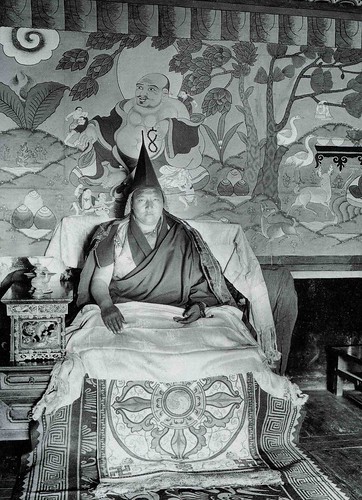
"One of the least-known spots in the world is this independent lama kingdom of Muli ... " his article begins, "Almost nothing has been written about this kingdom and its people who are known to the Chinese as Hsifan, or western barbarians."
This is typical Joseph Rock hype. Certainly, Muli was a little-known place, but it had already been visited and described by quite a few explorers and botanists in the two decades before Rock arrived there. Heinrich Handel-Mazzetti, for example (who like Rock, was a Viennese botanist) wrote extensively about his visit to Muli in 1915. Other botanists such as George Forrest and Frank Kingdon Ward had also been there. As usual, Rock claims he was 'the first white man' in these parts. You have to give him credit, though, for arranging his visit with the top man.
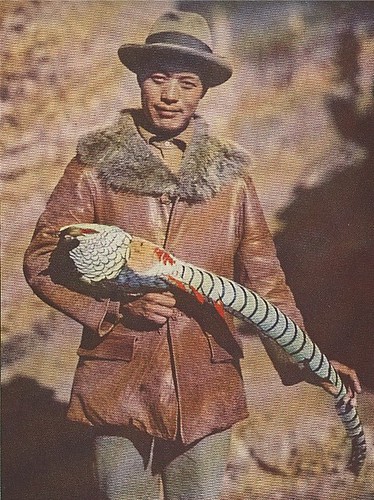
Rock first sent some of his Naxi plant collectors to Muli in 1921, shortly after making Lijiang the base for his plant collecting activities in Yunnan. With them, he dispatched a letter addressed to the Muli 'king', asking for permission to visit the semi-independent 'kingdom'. The king was in fact a hereditary Tibetan lama ruler of a small, obscure mountainous district, where the mountains of Tibet meet the valleys of Sichuan. It had a population of just 22,000 people, a mix of Tibetans, Pumi, Naxi and a few Han Chinese, Muli was nominally part of the small Chinese province of Sikang.
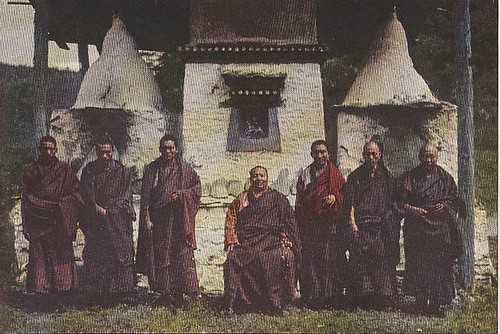
In the 1920s, however, it existed in something of a power vacuum following the overthrow of powerful Tibetan princes of Litang by Chinese warlords. Muli was a backwater and had little economic or strategic value to either the Tibetans or the Sichuan warlords. For this reason, the Muli 'king' was left alone to preside over his mountainous lair – for the time being. Another reason for Muli’s isolation was that much of the inhospitable high country surrounding it was roamed by hordes of Tibetan robbers. These gangs of thieves rode from their bases in remote mountain districts such as Xiangcheng, to raid and plunder the isolated settlements and to rob any travellers unfortunate enough to encounter them.
When he first inquired about visiting Muli, Rock was rebuffed with a polite refusal by the king, who sent a letter to Rock in Lijiang telling him that it would be inadvisable because of the danger posed by the bandits in the district. By 1924, however, with his plant collecting trip for the National Geographic Society almost complete, Rock deemed it would be worth the risk. He decided to “make a dash for Muli” shortly before he was due to return to the US.
In the 1990s, I also had to bide my time before visiting Muli. Although I’d first heard about Muli in 1991, it wasn't until 1994 that I got the opportunity to try visit this mysterious place. I was working as a journalist in Auckland and had married a Chinese girl, which was another reason for me to try and improve on my basic grasp of putonghua. I had copies made of Joseph Rock's article on Muli, and I trawled through the local libraries in search of more modern maps of the area. This was still the pre-internet era, and there was no Google available for searching out information on western China. Everything had to be done by legwork, using library catalogues and by consulting reference books and obscure journals. The fact that there was so little information available about Muli only served to spur my curiosity to even greater heights.
At the Auckland University library I found some reasonably detailed maps of Yunnan and Sichuan, which covered the area were Rock had travelled through to Muli. His 'Likiang' had now become Lijiang, and when he crossed the loop of the Yangtze, the town of Youngning he visited was still marked on the map, although now it was spelled Yongning. Nearby was a lake called Lugu Hu where Rock had rested for several weeks while on one of his other trips to and from Muli. Beyond that, the modern maps still showed only a blank space to the north east, where Muli was supposed to be. I decided I would go to Lugu Hu and Yongning and from there try walking to the north east, to try find the village called ‘Likiatsun’ that Rock had described as a day's travel towards Muli.
Seeking Muli, 1994
In March 1994 I kissed my new wife goodbye at Auckland airport and set off to look for Muli. I flew into Hong Kong's Kai Tak airport and then took a rather roundabout route to Lijiang, travelling via Wuzhou, Guilin, Kunming, Xisuanbanna and then a long bus ride up to Dali.
The stone streets of Dali’s old town were now full of westerners dawdling round the cafes and the souvenir shops that sold batik and jewelry. The local Bai people seemed inured to the novelties of foreigners, and there was a cynical, tired atmosphere to the place.
There were now several guesthouses open to foreigners, and in mine I recognised some of the same western faces that I’d seen along other points of the Yangshuo-Guilin- Kunming tourist trail, all going the same way after Dali, up to Lijiang. I hung around for a day, scoffing Dali pizza, drinking Yunnan coffee and listening to the rumours: The Chinese were building a cable car up the mountain behind Dali: the Thais were going to develop Lijiang's Jade Dragon Snow Mountain into a ski resort, complete with an ski lift; there had been huge riots in Tibet, hundreds killed; Deng Xiaoping was dead but the Chinese authorities were keeping it hushed up. In pre-internet China, there was no real news at all.
At the Dali Guesthouse the next morning, I was woken up at 6.30am by the Chinese guests who were already up and about, slamming doors, clanking their washbowls and shouting to each other. I wanted to go out and say 'Shh!', but that was the noise Chinese parents made to their infants when they wanted them to pee. As I ate banana and yoghurt muesli for breakfast at Marlee's Café, I mulled over some of the looming questions about my proposed walk from Lijiang to Muli: How much food should I take? Where would I stay each night? Should I take a sleeping bag? The nearer I got to the jump off point, the more difficult things looked. And less romantic.
The bus to Lijiang was overloaded with young westerners and their huge backpacks. A group of Swedes were trying to tug some reluctant locals out of their designated seats, while a German directed the stacking of all the backpacks in a wobbly pyramid behind the driver. The scenery en route reminded me a little of New Zealand: moorland hills, grazing sheep and clear streams. We zig-zagged up on to the Lijiang plateau, until suddenly the dominating Jade Dragon mountain came into view. We were in the land of the Nakhi.
Lijiang: Joseph Rock’s home town in China
Lijiang had come on a bit since 1924, when Joseph Rock described it as “a conglomeration of mud huts and a market place”. The old town was still there, looking a bit ramshackle, but still a thriving warren of ancient wooden houses and cobbled lanes, intersected by babbling streams. In 1994 there were very few tourists in Lijiang, and the streets of the old town were still the preserve of the Naxi people and their small businesses. There was, however, a grim modern ‘Chinese’ half of town, consisting of ugly concrete tenements and breeze-block shacks, where the dieselfume-filled air was rent with the noise of tractors, metal saws and distorted pop music.
Nevertheless, there was always the surprise sight of Jade Dragon Mountain peeping out from the end of a street, and the high-altitude glare conferred on the whole town a cheerful if somewhat eye-straining lightness. The local Naxi kids looked gangly and knockabout, they spoke hick putonghua and wore un-Chinese clothes like baggy jeans and Kicker-style boots. Meanwhile, in the alleys of the old town, elderly Nakhi women shuffled around slowly and quietly, carrying wicker baskets on their backs. They wore the characteristic Naxi blue smocks, and looked fit and sprightly. Younger women wore rightly coloured modern Chinese dress and could be seen crouching over the clear streams washing clothes.
This was the town where Joseph Rock made his home from 1922 to 1949, and where he did much of his academic work on the botany and anthropology of Yunnan. In the November 1924 issue of National Geographic he writes about his first impressions of Lijiang and its people in an article entitled ‘Banishing the Devil of Disease Among the Nakhi’. He describes the Naxi people with aloof disdain as a "dwindling aboriginal tribe" who lived a secluded existence in the canyons and mountains of western China. According to Rock the Naxi were a primitive people who eked out a living (“happily, as if in the Stone Age”) on the plains that lay under the shadow of the Jade Dragon Mountain, or ‘Mt Satsetso’ as he called it.
Living in isolation and governed by Mongol and Manchu invaders, the Naxi, according to Joseph Rock, had adhered to their traditional religious practices of sorcery and shamanism. He gives a lengthy and somewhat over-wrought account of a religious ceremony that he saw staged to cure a sick man, conducted by a Naxi shamen or Tomba. This involved the sacrifice of a cockerel at the height of a thunderstorm, and Rock makes it sound so melodramatic that I suspect he used more than a little artistic license to impress the National Geographic readership. His article on Lijiang does, however, include many fine portrait photographs of the Tombas in their ceremonial garments, and Rock documents the Naxi and their ways in the same methodical manner that he would use to document the novel plants, flowers and bird species that he came across in Yunnan.
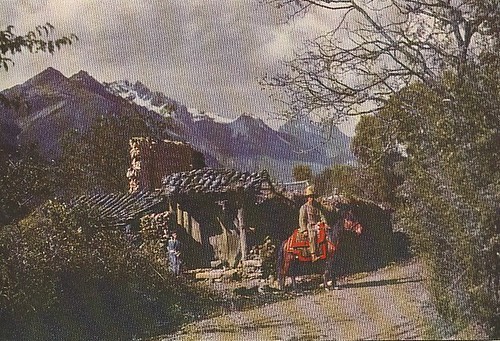
And yet despite living in the area for many years, Rock says almost nothing about the day-to-day lives and personalities of the Naxi people that he must have encountered. For this we must turn to Peter Goullart, a French-Russian émigré who grew up in Shanghai and who lived in Lijiang at the same time as Rock. Goullart portrays the town of Lijiang in a much more cheerful and down to earth way, giving it a human face. In his book The Forgotten Kingdom, we learn about the local characters such as Madame Lee, who runs a bawdy teahouse, and the many scurrilous local identities who passed through Lijiang. Goullart helped set up the first industrial cooperatives in Lijiang, and he gives a very clear and sympathetic portrait of daily life in what was then a charming and rustic Yunnan mountain town.

In contrast, the only thing that Rock has to say about the local people of Lijiang is that the Naxi men had become indolent opium smokers and the women seemed to do all the work. Perhaps this was because Rock had made his headquarters out of town, in a village a few miles to the north called Nguluko. Here, close under the mountain peaks, Rock kept himself aloof from the town life of Lijiang , save for a handful of his Nakhi ‘boys’ who acted as his staff and assistants.
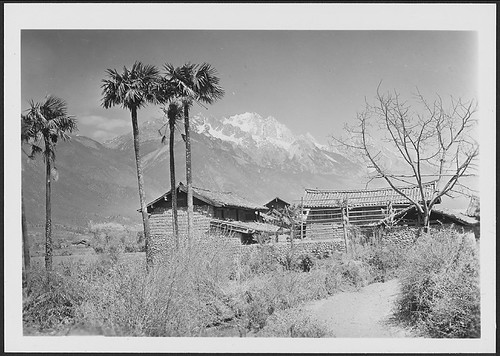
Women still seemed to be doing a lot of the work in Lijiang when I arrived in 1994. In the town's square, which was dominated by a statue of a waving Chairman Mao, slight young Nakhi women could be found sitting astride large Soviet-era motorbike-sidecar combinations. These served as the town's taxis, but there were no male drivers for these dark blue smoke-chugging contraptions. The men of Lijiang still seemed to enjoy an indolent life in the town's many teahouses and small restaurants. The Naxi women had a certain spirit of independence and élan. My female driver was dressed completely in leathers, while her friend driving another bike wore leopard-skin trousers and high heeled boots.
The strong female character of Lijiang was confirmed by the local Nakhi identity and expert on local history, Mr Xuan Ke (“as in Ravi Shankar”). He held court most nights in a room above a courtyard in the old town. The room was full of memorabilia, books, old furniture and photographs of old Lijiang. Western visitors would sit around for an hour listening to him describe Mosuo suicide rituals and Nakhi dances.
With his floppy hair, jeans, Hush Puppies and sweatshirt, the bouncy Xuan Ke looked much younger than his 64 years, and quite healthy for someone who had spent 20 years in a labour camp (his support for Nakhi culture had been deemed anti-Chinese). Xuan Ke's main interest was in Nakhi music. Since his release from the labour camp he had been leading a renaissance in Nakhi culture, one of the highlights of which was re-forming the original Lijiang Nakhi orchestra.
This was an ensemble of old men who played a Nakhi interpretation of 15th century Chinese chamber music. Performances were held on alternate evenings in a makeshift theatre in one of the courtyard houses of the old town. I went along to one of these concerts, compered by Xuan Ke, and attended by about 50 western tourists.
“I will tell you the story in broken English about our Nakhi orchestra, that did not have a chance to practice between 1949 and 1987,” Xuan Ke told the rapt audience. Behind him, the ensemble of geriatric men in Mao caps and proletarian blue jackets adjusted their flutes, gongs and banjos.
“By the way, we are called Nakhi people, not Naxi as written by the Chinese. Naxi sounds too much like Nazi,” he said with a wry smile. Xuan Ke then introduced the various members of the orchestra, starting with the oldest, Mr Zhao, who was 86 years old.
“In the old days Mr Zhao went on the mule caravan through Tibet to India, twenty times. These other old men often had fathers who were officers in the Kuomintang army, so they have had quite a bad life,” he said grimacing a little.

He then introduced the other old members: an accountant, a hunter, a factory manager, each giving a little nod as they were announced. Then Xuan Ke turned to look at the photos on the wall. “Our master musicians are very old. When they die, we turn them into black and white,” he said. “These men are like me,” continued Xuan Ke, pointing to three not-quite-so-old musicians in the orchestra. “They are Sheep. That means they were horn in the year of the sheep, 1930. We are all 64 years old. How do I look so young? That is because of the 20 years in prison, when I was trained like an animal to do hard work.”
Xuan Ke explained that the music they played dated from the Ming Dynasty, between 1000 and 1500 AD. The music had been introduced to the Lijiang region by a Chinese general, and had remained unchanged whereas mainstream Chinese music continued to evolve under the influence of China's Mongol and Manchurian rulers.
The first piece of music was quite unlike the feisty local folk dances: to my ears it was just a random clutter of cymbals, drums, flutes and erhu. Six teenage girls sang along in a plaintive chant.
“How did we keep this music unchanged and not the Chinese?” Xuan Ke asked rhetorically, when the tune had ended. The old men sat behind him, smoking, picking their noses and stroking their long grey beards.
“Firstly, because this is religious music used for ceremonies, and so we don't want to change it. More importantly though, Lijiang was so remote and isolated. In 1944, when I was 14 years old, I travelled to missionary school in Kunming. It took 11 days, first by donkey to Xiaguan, then by shaking truck. There was no gasoline, the trucks ran on charcoal. Lijiang was very isolated. At that time, fighting the Japanese, there were a lot of American pilots, the Flying Tigers, in Kunming. One day, the general, Joe Stillwell, came to Lijiang. My father spoke to him because he was the only local person in Lijiang who could speak English!”
'The third reason why our music did not change is because Lijiang is a housewife's kingdom,” Xuan Ke continued. “Everything here is done by the wives: 95% of the butchers here are women. Men lose face if they do hard work." (I thought about those Nakhi women in the square, straddling the big motorbikes with sidecars.) "The tradition here is for the Nakhi men to enjoy smoking, drinking, painting, and playing mahjong. If a man is seen carrying a basket, everyone will laugh at his wife! So, Lijiang is a nice place for gentlemens, but in this way, the gentlemens have also lost their power - the women have the key to the bank.”
The next piece of music had only half a title: "An Old Man Sitting By the Peaceful River Doing ... “
"Unfortunately, we don't know what he was doing,” said Xuan Ke, “It is from an old manuscript, and the worms ate the last words of the song title, so we will never know what that old man was doing.”
Half way through the tune, a young girl in the orchestra stood up and played a halting flute solo. At the end, she sat down, impassive to the applause. “This young girl is only 16 years old,” said Xuan Ke. “She has been playing the bamboo flute for only three months, but already she captures the soul and the colour of the instrument, don't you think? When we first started, the young people of Lijiang used to laugh at us and say 'Your orchestra is old and ugly!' But nowadays the young Nakhi students want to learn more about this music. Why? Because they see all you westerners coming here and they think it must be something good. They always look up to the west.”
Xuan Ke pulled a face. "The students need to escape from karaoke,” he sneered. “You know what karaoke means in Japanese? Empty orchestra. Empty, like the young generation. Their brains are emptied by this new weapon from Japan. All the words are nonsense,” He mimicked a pop song; "He chase after her... Oh, terrible!”And the audience laughed. “But now we are capturing more students, and that is important.”
Before the last song, Xuan Ke explained that this 'Dong Jin' religious music was originally used as therapy, to promote harmony and inner peace. And thus it was essential that we learn to 'receive' the music, rather than just listen to it. The key was to know the four music ‘receiving points’ of the body, he said, namely the end of the left eyebrow, the middle of both hands, below the navel, and the soles of the feet.
“You must concentrate on each of these points in turn, in a clockwise direction,” said Xuan Ke. And there were a few other rules to follow: “Close your eyes, but don't refuse the light in. Close your mouth, but with a smile. Keep the tongue touching the sky strongly. And don't think of anything else. Yes, keep everything away from your mind, especially MTV and dramatic rock singers,” he said. “If you practice this way, you will notice a warm feeling rising in your body. You will feel you are floating comfortably with the music.” I tried it during the last piece of music, but nothing happened. It still sounded like a random jumble of hollow drums and strings. Perhaps it was the uncomfortable ankle-high stools that prevented my concentration.
The next day I found that Lijiang was not a good place for picking up information about Muli. I asked around in the local cafes, but most people had never heard of the place. Muli was over the provincial border in Sichuan, and might as well have been in another country. The manager of Ali Baba's Cafe ('Open Sesame: 8 o'clock' according to the sign on the door) was more helpful than the others. I asked him whether it would be dangerous for me to walk alone through country areas. “Not really. The Yi people to the north are quite poor, so you shouldn't let them see your money, or get them angry. But you shouldn't have any trouble!” he reassured me.
I had started to get paranoid after reading the 'traveller's tips' notebooks in the local backpacker cafes. One person wrote of a drunken card game that he'd had with Tibetans in neighbouring Zhongdian, which ended with knives being drawn. Another traveller told of being smashed in the face by a rock thrown by an angry peasant when trekking in the Tiger Leaping Gorge: the traveller had refused to pay the man a 'guiding fee' after the man had helped him find his way back to the track when he got lost.
And in an incident near Lijiang, an American man wrote in disgust of how he'd had to bargain with a truck driver to take his seriously-injured wife to the nearest hospital after she was hit by a motorbike.
There was no mention of Muli or even Lugu Lake in the travellers' suggestion book. In the end, I had to fall back on the information that I'd already brought with me: the sketchy 1924 maps from Rock's National Geographic articles, and a crumpled photocopied page from a Chinese atlas. I would try follow Rock's route to Muli from Yongning, 100 miles northwards over the hills.
But first, I would tackle the Tiger Leaping Gorge.
The Yangtze and the Tiger Leaping Gorge
Everyone I met in Lijiang seemed to have either done the Tiger Leaping Gorge trek or was on their way to do it. It was the thing to do. A few of those who had done the gorge mumbled about it not being suitable for anyone with vertigo, while others made cryptic comments about the dangers of the gorge and its precipitous paths.
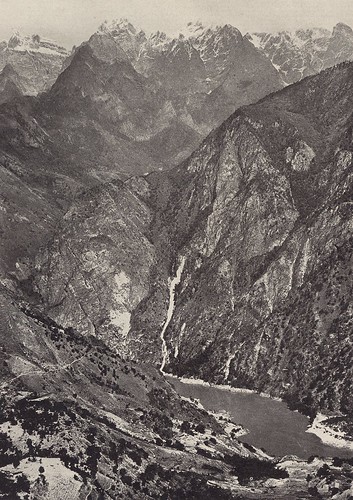
The Tiger Leaping Gorge was touted as China's Grand Canyon, a monumental chasm created by the Yangtze river as if flowed between the 5,000 metre mountain ranges of Jade Dragon Mountain and Mt Haba Shan. There was a mule track, chipped away from the sides of the canyon, which had become a popular two-day trek for the more adventurous among the western backpackers. Lijiang's cafes displayed posters advertising the guesthouses along the track: 'Stay at Spring Guesthouse. Free Showers' ... 'Try Chateau de Woody, Breathtaking Views'.
Joseph Rock had also been impressed by the Tiger Leaping Gorge, although he never refers to it by that name. The 'great Yangtze gorges' as he termed them, get a mention as an afterthought in a National Geographic article about his later travels to the Salween and Mekong rivers in north-west Yunnan around Deqin.
"By far the finest of all the gorges in Yunnan are those through which the Yangtze flows north of Lijiang. In grandeur these gorges may be compared with that of the Brahmaputra before it leaves Tibet for the Assam plain," he wrote.
Rock noted that the placid waters of the Yangtze above Shigu were transformed into a “mad torrent” as the river "pierced the terrifying gorge like a sword”.
"In many places the river is only 20 yards in width and is one continuous series of cascades and rapids. The actual depth of water must be enormous because here the vast placid stream is compressed into a narrow ribbon of white foam. The cliffs rise steeply on both sides, culminating in jagged crags and pinnacles, and above these tower the ice-crowned peaks of the Likiang snow range."
The Gorge lived up to all the hype. My first glimpse of it, from the starting point of Qiaotou village, was impressive: a mountain face rose sheer up from the sandy green Yangtze (known locally as the Jinsha 'Golden Sands' river), to be swallowed up in the clouds. The sun played on the tree-lined ridges, and in the distance, a narrow ledge of track could be seen bisecting the first grey cliff.
A sign at the ticket office read: 'The two cliffs push together as if fighting for hegemony'. Local legend had it that a tiger fleeing from a hunter had once jumped the narrowest section of the gorge, some 30 metres wide, to a rock on the other side: hence the name. But when I saw the first section of cliff-skirting track close up, I stopped dead and almost turned back immediately. It was barely a metre wide, with an unimpeded drop of a thousand feet straight down to the swirling white waters of the Yangtze below.
On a boulder nearby someone had painted in yellow: 'Here is dangerously. Be careful, strong winds are not your friend'. I braved the first few precarious yards without daring to look down. Then the path turned a corner and widened out to become a solid and unthreatening walk.
The first test was over. For the rest of the day, the track was a pleasant stroll through the epic canyon. Down below, the roaring Yangtze was funnelled into a narrow slot of solid rock, while its wider sections were choked with washed-up bits of timber. It appeared that pine logs were been floated down the Yangtze to sawmills in Sichuan, but a fair proportion of them never made it. Later on my travels, when I saw logging trucks struggling to haul five massive logs that had once been magnificent trees, I would wonder about the wastage of those hundreds of logs stuck in the Yangtze.
Halfway along the gorge, at a spot called Walnut Grove, I came to the guesthouses. They were part of a small hamlet, which with a few terraces of barley, clung to the sides of the gorge, overlooked by a towering wall of grey-cream rock that rose unbroken from the river up to the high buttresses of Jade Dragon mountain. It was an idyllic place. Rock stayed there overnight and he called it Djipalo.
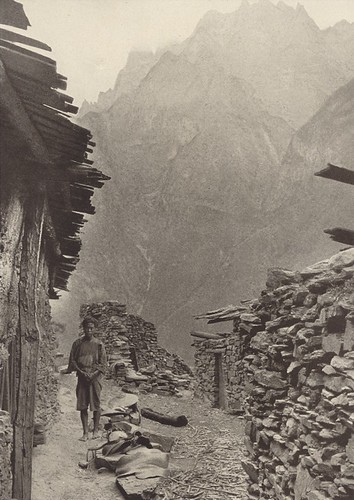
Sat outside the Tibetan chalet that was the Chateau de Woody guesthouse, with a beer in my hand, I was as happy as I could remember in a long time.
“Walnut Grove? Sounds like an English pub with MGs parked outside,” said Terry, an Australian guy I had met on the trail during the day's trek. We shared the quiet evening with a few chickens, piglets and a lazy dog for company. Scruffy local kids with snot running out of their noses shooed goats and donkeys along the path running in front of the guesthouse.
“What happened there?” I asked 'Woody', the soft-spoken owner, as I pointed to a huge raw scar on the cliffs above the river. “Ten years ago, the rock fell down,” he said. “There were two men panning for gold in the river. Both were killed. Their comrade survived because he had just climbed up here to collect their lunch.” The fracture had dislodged several huge chunks of marble the size of a house that had fallen into the middle of the river, and where water now surged over their tops.
At last light, Woody spied some more foreigners approaching from the opposite direction. It was a party of ten American kids. “Wow, man, that track was one boot wide in places,” one of them said. “You reach out to a rock for support and it just comes away in your hand. Not good for your confidence,” said a young woman.
I began to feel nervous about the next day. The Americans wouldn't say any more. They were language students in Beijing and wanted to practice their ni hao’s and xie xies on Woody. “This place is awesome. Better than anything in New England,” someone said in the dark.
The next day, my fears about the dangers of the Tiger Leaping Gorge were shown to be justified. After travelling alone for a couple of hours, by late morning I reached a difficult section of the track known as 'the landslide'. This was where a long section of the cliff had been swept away into the chasm below, the landslide taking the track ledge with it and leaving a steep slope of exposed rock and rubble. On these broken stones there was now a 100 metre stretch of a faint padded trail that had been made by the impression of the footsteps of recent walkers. Here the track was little more than a thin ledge of gravel jutting two feet out from the cliff, with a dizzy drop off to the right. In the middle of the landslide was a particularly steep section where the trail narrowed even further and seemed to disappear altogether in places, with just a hint of a line over some fallen scree and rocks. When I saw this, I was terrified and my instinct was to turn back immediately. However, this would entail a two day walk for me back to Qiaotou.
Meanwhile, Daju village, which represented the end of the Tiger Leaping Gorge trek, was tantalisingly close, and was just visible on the plain beyond the landslide. So near, and yet so far away.
The longer I hesitated, the greater my trepidation, and the harder it became to start off. The wind blew marble dust into my eyes, and spots of rain whipped my face. On my first attempt, I lost my nerve almost straight away and turned back in panic after only a few steps. I was wobbling under the weight of my backpack, which threatened to unbalance me and send me tottering over the edge, and down into the river.
On my second attempt I fumbled along the trail, unable to look anywhere except at my boots. I cringed at the low overhangs and muttered to myself: 'Slowly ... slowly ... no problem ...', one step at a time. Just when I thought the worst was over, the ledge turned around a blind corner to the left, and I saw to my horror that the track petered out into a powdery ledge just inches wide jutting out from the cliff face. Somehow, I teetered along it, holding my breath and hoping my footholds would be solid. Palms sweating, legs trembling, I made it across onto a 'normal' track, that was now a metre wide. I took a deep breath and swore to myself - "never again!".
To finish the gorge trek I dropped down a relatively easy trail to a placid section of Yangtze river where the coffee-brown waters cut through a miniature alluvial plain. Waiting there was a put-put engine-powered flat-bottomed punt, moored on the bank of the river, and I was its sole passenger as the ferryman took me across the Yangtze to the Nakhi village of Daju.
Joseph Rock had also been spooked by the dangerous trail through the Tiger Leaping Gorge. In his brief mention of the gorge he observed that beyond Bendiwan (Walnut Grove) "the trail is exceedingly dangerous, as rock slides occur continuously."
There was also a Daju ferry when Rock travelled through the gorge in 1923, but the boat had recently been smashed by marauding Tibetan bandits, and Rock was forced to turn around and return to Qiaotou.
After I crossed the Yangtze, I found Daju to be just a dusty village square with a store, a restaurant and a guesthouse. There was one bus a day back to Lijiang, and I had missed it. With nothing better to do, I wandered around the village alleys and used my newly-acquired Chinese to read the big character slogans daubed on the mud-brick walls. 'The Soil Is The Mother Of Prosperity. Labour Is The Father!’ said one. 'Stick To The Socialist Road! Uphold The People's Democracy!' exhorted another. 'Adhere To Mao Zedong Thought!' ... 'Follow The Party Line Unwavering For 100 years!' And the most recent: 'Opening-up And Reform Is The Road To A Strong China!'.
There wasn't much else to do in Daju except sit in the restaurant and wait. “What do you do for fun around here?” I asked the waitress that evening, as we sat alone in the poky room lit by candlelight. She was knitting. “Oh, sometimes I go to karaoke. Or if I'm here I talk to foreign friends and practice my English,” she replied. I was the only foreign friend in Daju that night.
The wind howled, and I went back to my creaky wooden room at the guesthouse, to listen to the scampering of mice in the roof.
The next morning, before I took the bus out, I scrambled up one of the hills outside Daju in the hope of getting better views of the surrounding area. I wanted to get an idea whether it would be possible to walk directly from Daju to the next bend in the Yangtze, and perhaps beyond, to Yongning. No chance. After an exhausting scramble, when I reached the top of the first ridge, all I could see was one enormous steep ridge after another, stretching to the horizon. It had been hard enough climbing this one hill without a pack, and I reckoned it would be impossible for me to scale several such high ridges carrying a heavy backpack. I would just have to return to Lijiang and start from there.
The bus ride back to Lijiang proved to be almost as terrifying as the worst parts of the walk through the Tiger Leaping Gorge. The bus set off two hours later than its 9am advertised departure time, after the driver gobbled down a bowl of greyish translucent cubes of tofu jelly and won a game of Chinese chess. I was his only passenger, but he also brought along his son for the ride. The road ascended out of Daju to a dizzy height above the river. After two hours of driving I could still see the village of Daju far below us, beyond the many zig-zags of the switchback road. There were steep drop-offs on one side of the narrow, pot-holed trail, and I didn't have much confidence in either the driver or his vehicle. He drove with one hand holding the wheel, the other clutching both his jar of tea and a cigarette. Every few minutes he would swap hands to have a swig of tea or a drag of his ciggie, temporarily losing control of the steering. The bus would veer across the road, seemingly teetering on the edge, and I cringed by the door, with the idea that I might try to leap out should he lose control of the vehicle completely and we plunge off over the edge.
It was a tiresome journey. A cold wind blew into the bus through the many missing or broken windows. The driver kept stopping to top up the radiator with water that he scooped up from roadside ditches. He poured this, weeds and all, into a funnel located next to the steering wheel. The nerve-wracking nature of the ride spoiled what could have been an enjoyable scenic drive. We had excellent views of the 13 snowy peaks of Jade Dragon Mountain. Finally, we crested a pass and the driver switched off his engine, to coast back down the other side on a series of switchbacks of dirt road towards the Lijiang plateau. Now it was my turn to fret about the brakes not working with the engine off, but we made it back to Lijiang in one piece, physically, if not psychologically.
Starting point: Lugu Lake
If I learnt one lesson from my trip through the Tiger Leaping Gorge, it was that I was carrying way too much stuff. When I got back to Lijiang, I dumped my hefty backpack in a storeroom at Mama Fu's restaurant, and I bought a cheap Chinese army knapsack instead. Almost every Chinese town had a shop selling army kit: everything from tropical shirts to fur lined greatcoats for Siberian border duty, not to mention useful accessories such as electric cattle prods for crowd control. My little olive green bag cost me about 30 kuai.
I chucked out my sleeping bag, my books and loads of other junk. All I took with me was my raincoat, a change of socks and toothbrush. Then I went shopping for food. There wasn't much on offer for the potential trekker in Lijiang. I had to make do with peanuts, chocolate, green raisins, beef jerky, powdery biscuits and a packet of dried prunes. Fresh fruit and drinks I reckoned could buy along the way.
When Joseph Rock prepared his caravan for his Muli trip he had to plan for his large entourage of Naxi assistants, eleven mules and three horses. "One needs to be a good housekeeper indeed to prepare for such a caravan," he wrote. He took supplies for a month, and his shopping list for one of his later Muli trips gives an idea of how much he took:
" ... tents, folding chairs and a table, camp cot and many trunks with photographic supplies, cut films and colour plates, developer, coffee, tinned milk, tea, cocoa, butter, flour salt, sugar, some tinned vegetables( for the grassland Tibetans are strangers to vegetables), fruits, sugar."
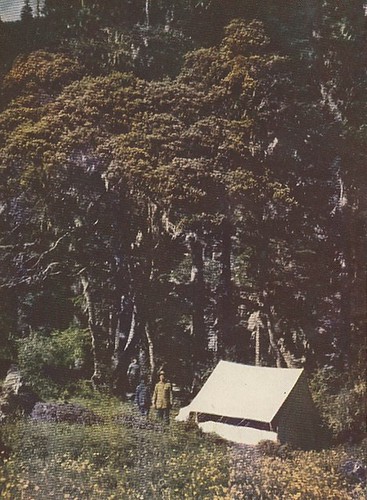
Travelling through remote areas that supported by subsistence farmers, Rock had to be self sufficient and bring supplies both himself and also for his party of helpers.
"The men carried brick yea and yak butter, dirty lumps of salt, Chinese brown sugar, and large supplies of native flour to make their baba (bread), sometimes shaped into round loaves, and sometimes into cornucopias, which they steamed into a large dumpling in a covered pot over a wood fire."
His caravan also had to bring a multitude of equipment for his collecting.
We took quantities of paper made out of bamboo, to be used as blotters for drying botanical specimens; two large boxes packed tight with ginned cotton to protect birdskins ... last but not least, our equipment included our trunk of medicines. I was anxious to guard against the fatal relapsing fever so prevalent in Tibetan country."
For my solo trip, the little bag of essentials that I'd prepared seemed pathetically inadequate, but it would have to do.
The night before I left for Lugu Lake there was some sort of activity going off in the Lijiang town square. Young women of different minorities milled around in groups, flirting with the young 'liumang' lads. The Nakhi girls wore blue capes with seven white circles on their backs, representing stars - to show that women held up the sky. Bai women wore a collage of pink, white and blue garments and the Yi women had several layers of pleated dresses in the rastafarian colours of red, green, yellow and black. They also wore the craziest hats: a flat black square like a graduate's mortar board, with a curled corner pointing forward looking like a crow's beak.
The men were much more drab in appearance: most wore the standard Chinese cheap dark suit, often with a tailor's label still stitched on to the jacket sleeve. Likewise, they wore square plastic sunglasses with the sticker still on the corner of the lens. In the 1990s, there was something about the new-to-capitalism Chinese psyche that made them leave the labels and shop wrappers on their purchases: cars would still have the barcodes from their Japanese shippers stuck on their windscreen, bicycles were pedalled round with plastic packing still wrapped around the frame. Even sofas would retain their cellophane wrapping for weeks after their purchase. In China it was important to display the brand ('paizi') and to show that something was 'new'.
On his departure for Muli in 1924, Joseph Rock had to use a little subterfuge. The local Chinese magistrate in Lijiang refused him permission to travel, saying that the Chinese New Year period was a dangerous time to be on the road in rural China. This was because, according to Chinese custom, all debts have to be settled on or before the Spring Festival. This meant many debtors resorted to highway robbery to acquire the necessary funds and thus to avoid the disgrace and loss of face of unpaid debts. Rock bluffed the magistrate, saying he would only be going as far as Yongning, and eventually the Lijiang official relented, but only after insisting he take with him with an escort of 10 Naxi soldiers. Rock was not impressed with these bodyguards, many of whom were mere boys of 14 or 15, armed with rusty Austrian-made muzzle loading rifles dating back to 1857. According to Rock, the guards were more trouble than they were worth, intent on plundering every settlement that they passed through.
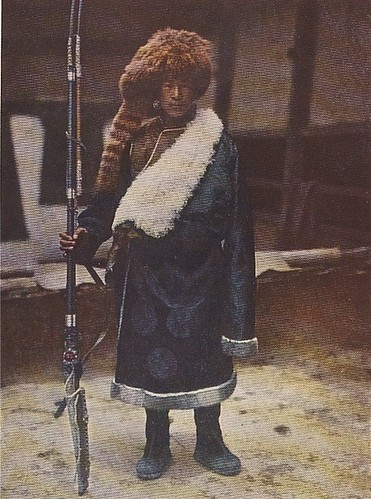
"They settle on a village like flies on a pie, and rarely pay for what they eat, but bully the farmers ...." he noted. To their disgust, Rock made a point of making them pay for everything.
It took Rock five days to get from Lijiang to the first and only significant settlement on his route to Muli, the small town of Yongning. He started off in the middle of January, traversing the brown and arid plain of Lijiang underneath the multiple snow peaks of the Jade Dragon mountain range. The trail passed through brooding forests of fir, larch and hemlock, along ravines and over mountain paths that he says were the most treacherous he had so far encountered in China. His route was to the north-east, within a loop of the Yangtze river where the river turns north for a hundred miles and then doubles back again south. The land he passed over was sparsely populated with just a few primitive Nakhi farmers ("as shy as deer") who lived in mud huts ("like swallows' nests against the cliffs").
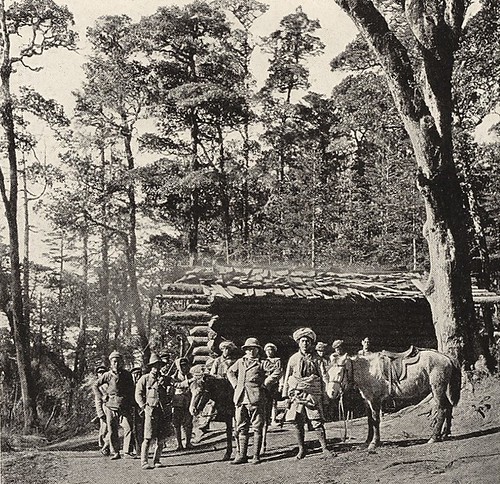
The Naxi village women wore pleated white skirts and had huge earrings of copper and silver that were so heavy they had to be held up with string around the ears or even over their heads. Near the Yangtze, Rock passed the site of a recent battle that had taken place between a thousand Tibetan 'marauders' and some Qing government Chinese troops, during which most of the Chinese soldiers had been slaughtered. His route to Yongning then required a steep descent into the canyon of the Yangtze river, crossing the huge river by a rickety wooden ferry, and then an arduous ascent up steep cliffs on the far bank.
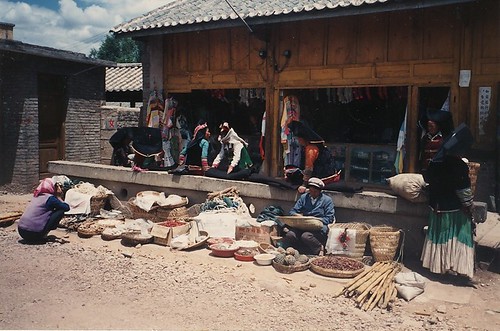
In 1994, my trip to Lugu took me two days in an overworked minibus, travelling via a dirty town called Ninglang. The bus creaked over eroded treeless hills and took me deep into remote Yi territory. These were the 'Lesser' Cool Mountains (Liang Shan) and the Yi (or 'Lolo' as Rock knew them) were a wild, poor people who tilled a barren yellow soil. 'They are very backward. They do not wash,” the Han Chinese in Lijiang had said about them. Even the Naxi compared themselves favourably with the Yi. “We Nakhi are the best educated of China's minorities. Unlike some minorities we have a strong culture,” they said, referring to the Yi.
In the countryside around towns such like Ninglang, the Yi were literally dirt poor. Their dwellings had changed little since Rock wrote of them: “The houses of these primitive people are of rough pine hoards, tied together with cane, and the roofs weighted down with rocks.”
I got a chance to see a few Yi women at close quarters when some of them squeezed their way onto our bus. They smelled of the farmyard, and had freckled, weather-beaten faces and wore grubby, unwashed traditional dress, little changed since Rock described them:
"The Lolo women wear skirts decorated with old fashioned flounces, reaching almost to the ground, and short jackets. Hats, with broad, flopping brims, resembling the heads of antediluvian ichthyosaurs, usually cover their wild unkempt heads."
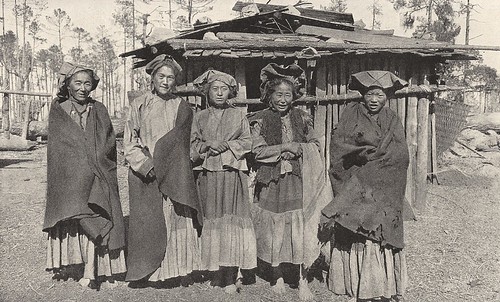
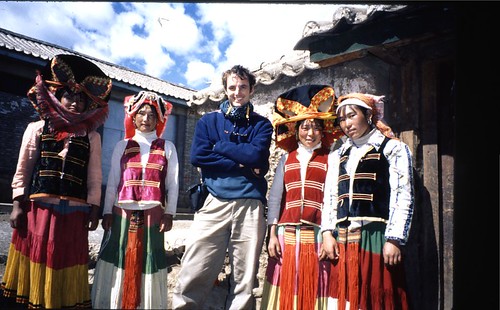
The Yi women I encountered looked almost European - they had round eyes, aquiline noses and they spoke to each other in weird high-pitched, coo-ing voices. They were the some of poorest people I saw in China. I could well believe that until forty years ago, they had been a slave society, despised by the Chinese and bestowed with the derogatory name 'Lolo', ('wog'). The Yi had until recently been divided into a noble 'black' branch and a more servile 'white' branch of Yi, most of whom were effectively slaves. The Yi in this particular area had originally been outcasts from the main Yi area north of Lijiang, and thus were doubly wretched. Liberation had brought them freedom from slavery, but little else in the way of development.
Our bus made an overnight stop in dismal Ninglang, where there was nothing for me to do except sit in the room of my guesthouse and watch Chinese television. The TV programmes broadcast from Beijing - and the advertisements in particular - seemed a world away from this rural backwater.
The following morning I was the centre of attraction in the bus station as I waited to re-board the bus to Lugu Lake - one village idiot stared at me with such intensity that I had to run around to shake him off. Back on the road, we passed through more rural emptiness. On the mud walls of one cluster of houses the local propaganda committee had painted a large message in white paint that said in Chinese characters: "Drive Carefully - the road is dangerous and the hospital is far away!"
It was therefore with some relief that we finally arrived at Lugu Lake. After the barren brown countryside the lake shore seemed like a verdant earthly paradise. The blue lake waters twinkled in the sunlight below the crags of Lion Mountain. Cuckoos sang in the forest and the air was fresh and cool. The local people, the Mosuo, were famous for being a matriarchal society practising a kind of 'free love'. They were a distant branch of the Naxi minority, a cheerful and robust people who built sturdy wooden manor houses around the lakeside and carved dugout canoes to fish in the lake.
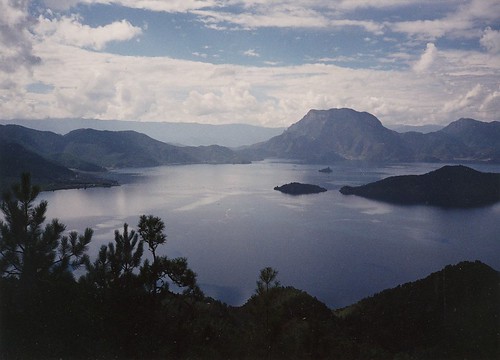
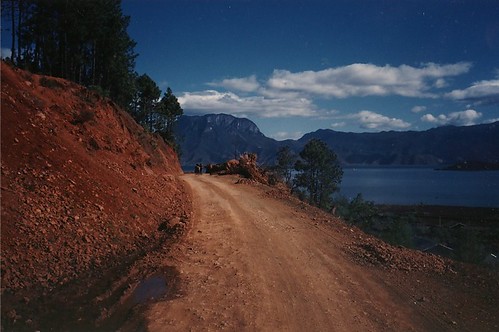
Unfortunately, when I arrived at the lake, I was in no fit state to appreciate any of this. I'd started to feel a bit queasy in the afternoon, something I put down to eating a greasy pancake that I'd bought from street vendor during a brief stop in a Yi village en route. The final hour of the bus journey became a nightmare, as the potholed road bounced me up and down on the back seat, and I tried to suppress the urge to throw up. On arrival at Lugu Lake, I staggered off the bus, too weak to stand up and immediately vomited in the courtyard of the guesthouse where we had stopped. I took refuge in the first room I could find and collapsed onto the primitive bed, feeling like I was going to die.
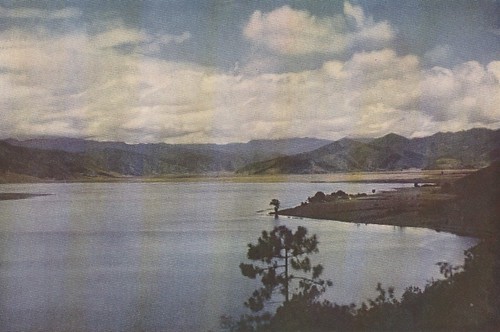
In 1994 there was only a trickle of tourists - almost all western backpackers - getting through to Lugu Lake, and there were no hotels, just a few 'homestay' style guesthouses. I spent my first day there alone, feeling vulnerable and miserable as I shivered under the blankets with all my clothes on, and cursing myself for dumping my medicine kit and antibiotics with my backpack in Lijiang. As night fell, I was visited in my room by a cheerful group of engineers from Chengdu, who had taken pity on me after seeing my plight on the bus. They said they would take me to see some 'friends' who might be able to help me, and so I staggered after them in the inky black darkness, through a maze of paths and passageways until we suddenly entered a dimly-lit spacious living room off the courtyard of a Mosuo house.
Sat around a crackling fire were two Americans, who introduced themselves as Will and Eileen from LA. In my fragile state they were a very welcome sight as they beckoned me in and offered me antibiotics and moral support. As I sat with them sipping tea, they enthused about the tranquillity and beauty of Lugu Lake. They were so enchanted with the place that they had extended their stay here for several days. They were particularly delighted at being able to stay in a Mosuo house amidst all the pigs, cows and geese.
Being a Mosuo household, only women lived in the house: mother and aunt in traditional blue-black gowns and turbans, the daughter in modern Chinese dress. The father, referred to as 'uncle', lived elsewhere, but he popped in regularly to see what was going on. Mosuo women would have several different lovers before they married, we were told. A Mosuo couple would only be regarded as 'wed' once they had produced a baby. The woman would then bring up the child in her own mother's house, without a live-in husband.
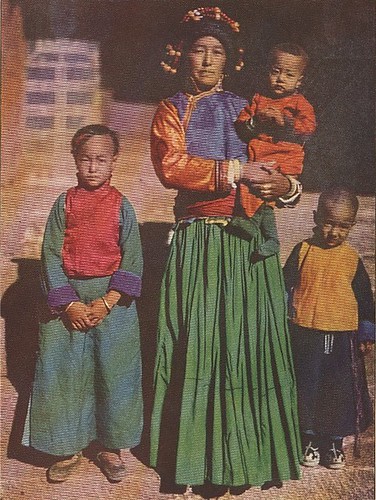
Will and Eileen told me they'd been staying with this Mosuo family for almost a week, living off a bag of vegetables that they'd had brought in from Lijiang. Apart from potatoes, there were no vegetables to be had at Lugu Lake. The Mosuo women cooked up some barley sugar 'crisps' that helped restore my energy. Late that evening, feeling somewhat better, I sauntered back round the lake under the moonlight, passing a few fishermen huddled round fires.
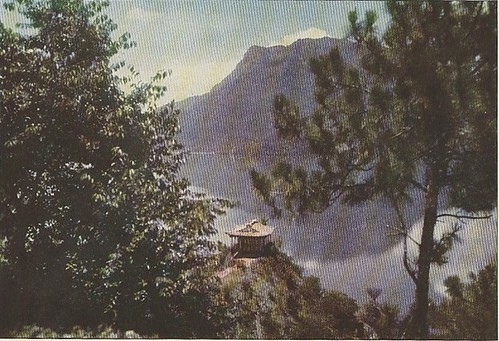
I was now within the realms of Joseph Rock's hand-drawn maps. He had made several lengthy layovers at Lugu Lake on his travels to and from Muli. On one occasion, he took refuge on one of the islands from a bunch of disgruntled Tibetan rebels who had been repulsed from an attack on Kunming. The island still had the remains of a small lamasery that was shown in Rock's pictures, attended by a chanting monk. Nowadays the local villagers rowed tourists out to the island in dugout canoes.
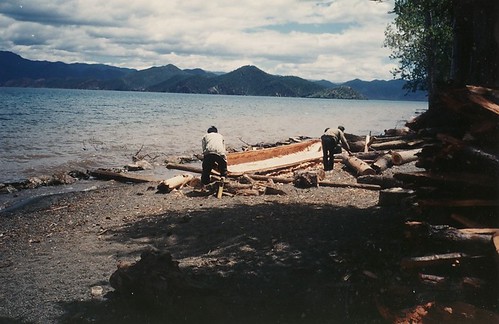
Rock referred to the Mosuo as the 'Lushi' sub-tribe of the Naxi. He made a passing mention of their matriarchal lifestyle in his articles, but otherwise said surprisingly little about the Mosuo given the current lurid interest in their supposed 'free love' society. The famous Mosuo singer Namu, however, recounts in her book ‘Leaving Mother Lake' how the older generation of people at Lugu Lake remembered Joseph Rock as being one of the few foreigners to visit the area.
He was said to be a "fat man with blue eyes" who travelled slowly because "he stared at plants for hours".
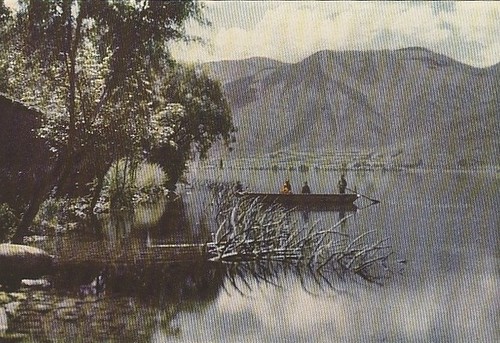
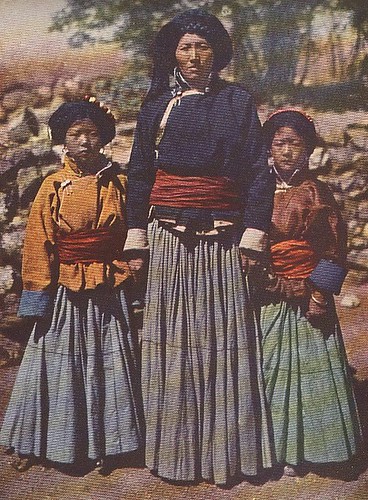
The Mosuo grew to like Joseph Rock, and even protected him when he incurred the wrath of some belligerent nearby Yi tribes. The Yi believed Rock was the cause of a fierce hailstorm that had ruined their crops. Thinking that Rock was staying at Lugu Lake, they took their revenge by pillaging cattle and horses from the villages around the lake, burning some houses and trampling the crops by riding their horses over them. When Rock returned and saw the damage that had been done on his account, he felt sorry for the Mosuo villagers. To compensate, he built the Mosuo a special 'palace' pavilion on Nyorophu island in the middle of the lake. The pavilion was made from specially imported glass, and the Mosuo were impressed as most of them had never seen glass before. People came from miles around to see and touch the glass, and the pavilion remained a popular attraction for many years, until smashed by Red Guards in the 1960s.
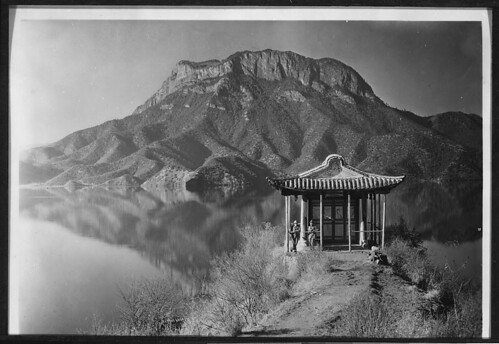
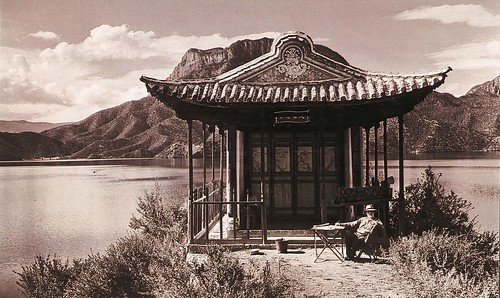
Rock became something of a legend among Mosuo people, according to Namu, and was respected because he took the Mosuo and Naxi culture seriously and documented their ceremonies. During his sojourns at Lugu Lake, he treated the local people for the endemic venereal disease using medicines imported for the US, and he honoured their chief by giving him a pair binoculars. Interestingly, Namu also claims that there were several fair haired children in villages around Lugu Lake, something she attributes to Rock's tenure there.
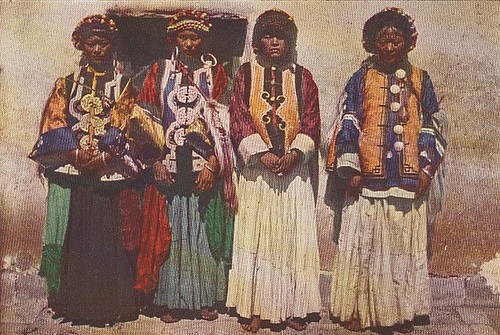
The only blondes I saw around Lugu Lake were the Californians. Walking back round the lake the next morning, with the water lapping quietly on the shore, I saw one of the canoes being paddled out to the island. The sight of the oars rising and falling, and the sound of shouts and songs carrying over the water reminded me of the New Zealand Maori war canoes, the 'waka'.
Further along the shore. I came across a friendly group of art students from Chengdu. They were squatting with their pallets, painting watercolours of a white stone stupa by the lakeside. Nearby, the villagers were building a two-storey hall completely from wood, but without using any nails. Lugu Lake had a restful and timeless atmosphere, and I spent a lazy day recuperating from my stomach bug. Inside the courtyard, sheltered from the gusty winds, I sat in the warmth of the weak sun among the piglets, geese and calves, and I perused my maps.
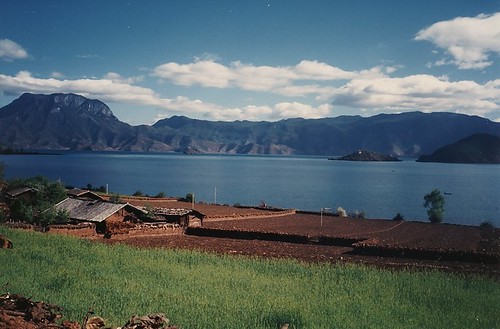
According to Rock's 1924 map, Muli monastery was about a 50-mile walk in a north-easterly direction from Lugu Lake. The map wasn't very detailed and gave no clues as to the topography. Beyond the nearby town of Yongning there were no other features to follow except for a couple of villages. I would just have to ask my way as I went along. Back in 1924, Rock had done the journey from Lijiang to Muli by mule in 11 days. He described it as: “ ...one of the most trying in south-western China... it takes a hardened constitution and great powers of endurance to make the trip.”
My constitution wasn't feeling too hardened. In fact, with my wobbly stomach and a rapidly dwindling supply of food, I really didn't feet up to it. Decent food was hard to come by in these country areas. The Mosuo seemed to survive on a simple diet of potatoes, fish, eggs and chillies. There were few other vegetables to be had. Luckily, Will and Eileen still had some of their stocks left and were generous enough to share them with me. Each mealtime they would give the Mosuo mother a cucumber or some tomatoes to fry up. An hour later we would be sat in the dark living room with a few beams of light coming through the roof, eating a dinner of potatoes, sausage, eggplant. egg and tomato soup, corn wine and tea. The old lady would sit in a corner making butter tea with a plunger device.

Despite its beauty, Lugu Lake was a low point for me. After spending several weeks on the road, I was growing sick of China. The novelty had worn off and I was fed up with stop-start bus travel and the poor food, I hated the stares and the sniggers that made me feel like I was an exotic animal in a zoo. On top of all this, I'd come to realise that I wasn't cut out to be an explorer: I missed my little home comforts. Despite all my pretensions of roughing it and being a 'knockabout sort of bloke' , all I really wanted now was to be sat in a cafe sipping espresso and reading a decent English newspaper.
Before coming to China I'd fancied myself as a modern-day adventurer, blazing a trail through the back roads of Yunnan. Here I was, patting myself on the back and thinking the journey to Lugu Lake had been a gutsy venture into the unknown, and yet these Californians were treating it as they were on a visit to a theme park. They didn't speak a word of Chinese but they were right at home, communicating with enthusiasm using a few grunts, grins and sign language. Meanwhile, I felt like I was at the edge of the world, and my attempts at speaking Mandarin were met with puzzled frowns from the local Mosuo. I'd had enough of China and I wanted to go home. When the Americans said they'd found someone with a van who would to give them a ride all the way back to Lijiang the next morning, I was really tempted to go back with them. Somehow I managed to resist the urge to take this attractive option.
However, it was with great reluctance and foreboding that the next day, after a breakfast of roast potatoes, steamed bread and butter tea, that I said goodbye to Will and Eileen. They were going back to Lijiang, while I would carry on to Muli.
The first steps: Yongning
There was no bus to Yongning, 20km to the north of Lugu Lake, so I started walking. As I walked through the middle of the lakeside village I passed one of the Chengdu art students, carrying her paintbox disconsolately up the road, looking for inspiration. I felt the same way. But as I left Luoshui behind me and climbed the road above the lake, I felt happier and freer to be among the wind, the trees, sun and the bird song. It was good to be doing something rather than just sitting around. After a while I started to sing to myself, and plodded along in this fashion for the next four hours, skirting pine-clad hills and onto the Yongning plain.
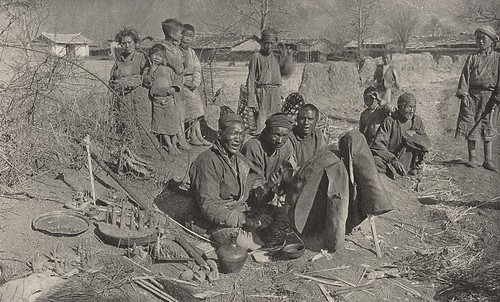
Just before I arrived in Yongning, I came across my first signs of Tibetan influece: a silver dagger that somebody had dropped on the dusty ground. I picked it up, pocketed it and carried on my way.
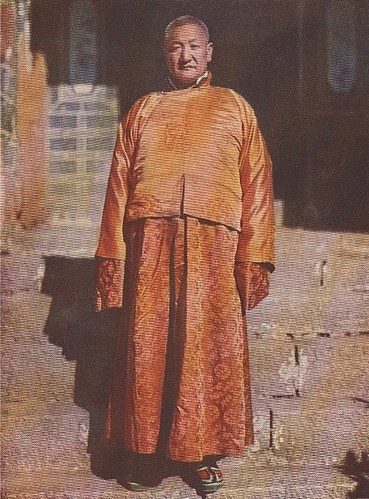
In 1924, 'Youngning' was the capital of the Lushi tribe territory, and was ruled by a chief who was descended from the first Mongol ruler appointed by the Kublai Khan. On his many subsequent visits to Yongning, Joseph Rock was to become good friends with this local chief, known as the 'tusi' or 'dzongpen'. In fact, the Yongning chief was one of the few real friends that Rock ever had in China.
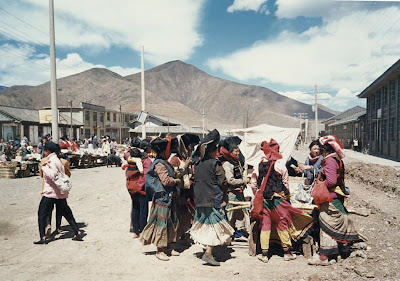
On his first visit to Yongning, Rock used the town as a rest stop after the many arduous days he had spent in the saddle traversing the Yangtze gorge on his way from Lijiang to Muli. He says he met no Chinese here, only a variety of "opium-sodden Nakhi", some 'primitive' Yi tribesmen and a handful of aggressive 'Hsifan', or 'western bandits', as the Tibetans were called by the Chinese).
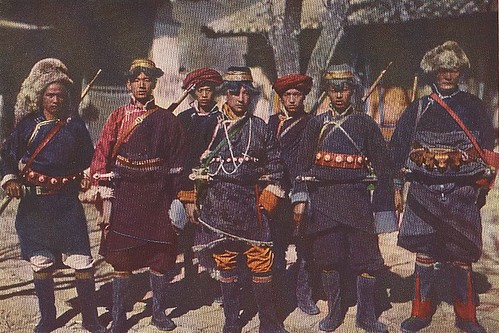
In 1994, Yongning had the dreary air of a Han Chinese frontier town: it was little more than a handful of ugly concrete shells and a collection of log cabins around a market square, where Yi women traded a few wilting vegetables. And whereas Rock took advantage of “the monastery and its hospitable shelter”, I had to make do with the 'County Guesthouse': a breeze-block tower surmounted by a satellite dish that seemed to be part of the local Party headquarters. After I checked in, I had a bizarre encounter with a young woman who led me into a shower room and made some vague gestures about disrobing. Whether she was a prostitute or just one of the staff trying to show me where the showers were, I couldn't tell.
I walked a few hundred yards down the road to find Yongning's Buddhist monastery, which was still intact, but under renovation to repair years of destruction and neglect. Only a single small prayer hall of the original structure remained, the main prayer hall was quite different from the one seen in Joseph Rock's photographs.
Rock had visited the monastery and taken many pictures of the Buddhist ceremonies there, as well as photographing the oracles and shamens on Yongning. It had once been a very active monastery. Now it looked almost deserted.
I walked through the gateway of the 'Zhamei Si' and wandered among the Tibetan workmen who were milling around among woodchips and piles of bricks. I looking for someone who looked vaguely like a monk, but everyone was in 'civvies'. A man who looked like the foreman took me to one side and asked me what I wanted. “Is it possible to walk from here to Muli?” I asked. “Yes, but it's dangerous. It takes three days through high mountains. Even we dare not do it! You should go by bus instead, back through Ninglang and Yanyuan,” he said, making a wide circular motion with his arms. But that would take too long, I thought, and anyway I would probably get turned round by the police en route because Muli was still officially a 'closed area' for foreigners.
I pulled out Rock's original map from my bag and showed it to the foreman, asking him about the villages marked along the route to Muli. The first, 'Vudju', was now called Wujiao by the Chinese, the foreman told me, and it was a day's walk from here. And the nearby lamasery of Rendjom Gompa mentioned by Rock was still there, he said, but now with just a single monk in residence. At that moment I noticed a dark-skinned Tibetan-tooking man in a green uniform, sat around the fire having a smoke. He stood up and ambled over to see what was going on, and I realised with dismay from his arm badge that he was Gong An Ju - Public Security Bureau. My heart sank, and I expected to be questioned and warned not to go to Muli. But the PSB man just smiled and stabbed his palm the air in the direction of Wujiao. “Hey - If you go to Rendjom Gompa, ask for the lama called Aja Dapa. Tell him I sent you. He knows me: I'm the Yongning policeman.”
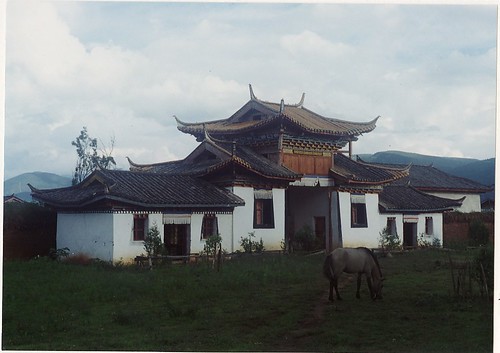
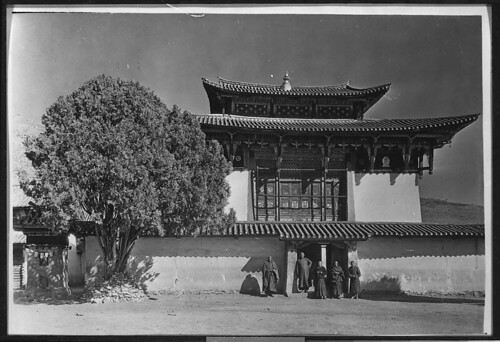
The foreman then led me towards the prayer hall, to see the interior of the renovated temple. Inside, once my eyes had adjusted to the gloom, I saw a row of gilded statues representing former abbots of the monastery. The statues were sitting lotus-position on multi-coloured thrones, they all had neat yellow hats and were surrounded by animals and flowers. And in a dark corner, a lone monk squatted on a cushion on the floor, chanting and banging a gong.
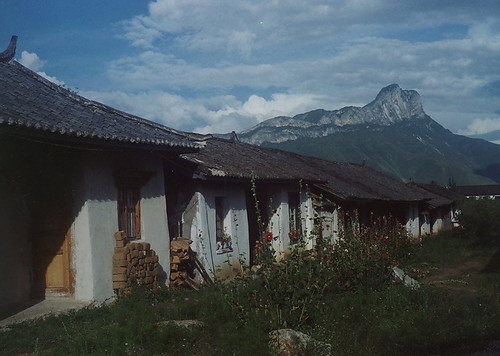
Back out in the open air, I wanted to get a better view of my intended route, so I climbed a thousand-foot high grassy hill behind the monastery. It was only a small hill but I was soon out of breath due to the altitude. As I reached the top, which was cluttered with prayer flags, I saw snow-bound mountain peaks to the north. I almost jumped for joy: surely, those were the Konkaling peaks? And some other less spectacular rocky ridges to the east must be near Muli monastery, I thought. Looking around, there seemed to be a fairly straightforward route from the Yongning plain over some low hills, to those Muli peaks. Now my intended trip looked do-able, and I was happy. The doubts of Lugu Lake were all forgotten.
Below me I could see the monastery of Yongning - and I was in the same spot where Rock had taken a photograph of the monastery more than 70 years previously.
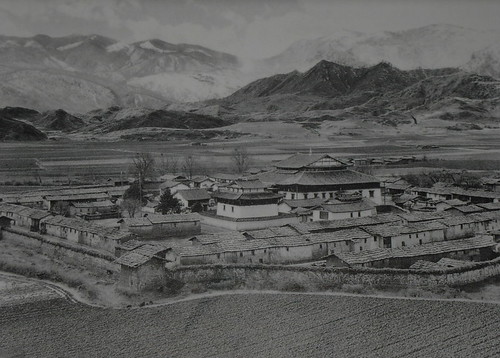
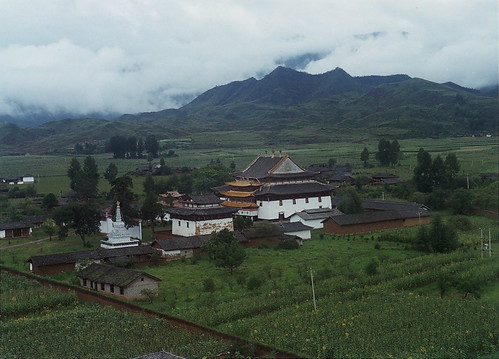
That evening, in the blacked-out village of Yongning, I sat in the town's rather basic restaurant, celebrating my first sight of the Muli peaks, with a bottle of beer. “What do you want to go to Muli for?” asked the Chinese waitress, when I told her my plans. “The people there are poor and backward. There's nothing to see.” To me, it sounded encouraging. I retired to my lonely and cold guesthouse room. Outside, across the street in the darkness, a small crowd had gathered around a doorway with a thick curtain over it. From within came the crackly thuds, whacks and a staccato dialogue of a Chinese kung fu film.
Walking off the map
My trek to Muli monastery really began at a village called simply Wenquan ('Hot Springs), about three miles east of Youngning. I hitched a ride out there on a logging truck, and found the springs were still very much a feature of the village. They had been turned into a civic amenity by plonking rendered concrete walls around them, to make primitive cubicles.
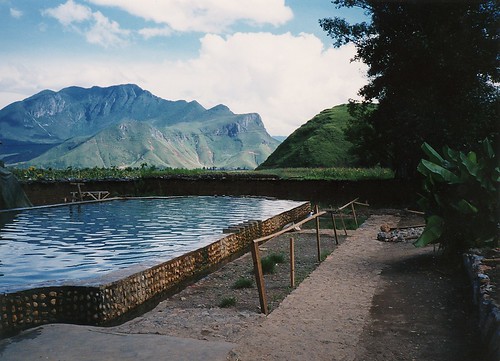
The bath-houses had steaming, slime-smeared pipes to deliver the hot water, and an attendant charged 2 yuan to fill up one of the sunken square concrete baths. The baths were popular with the local Naxi and Mosuo people, who seemed to be using them for their ablutions and for doingn their laundry rather than as a spa treatment. In Rock's day this village was known as Wualapi, and it marked the southern boundary of the Muli kingdom. I passed up the chance for a bath, and instead set off in the mid-morning sun, along a mule track that ran through ploughed fields, in what I hoped was the direction of Muli.
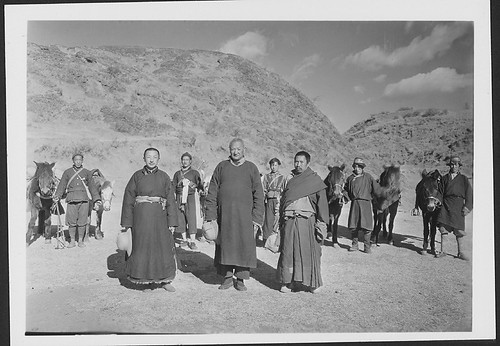
In the fields of reddish brown clay, a few local people were yelling at their plough oxen, trying to stir them into action. Cuckoos were singing when I left the plain and ascended into the pine forests, but walking alone I began to feel a bit apprehensive, as if someone was watching me. I fingered the Tibetan knife that I now kept handy in my pocket, and found myself jumping with a start every time my footsteps broke a twig.
When I paused to sit for a rest and have a swig of water, I heard a 'thwack' beside me and looked up to see an old Naxi man and a young boy sat a few yards away, laughing at me, and about to throw another stone. They told me they were on their way from Wujiao to Yongning, to sell their home-made firewater at the market. They asked me the same questions I was to be asked by almost everyone I encountered 'on the road'.
"Are you alone?" they asked. "Where are you heading? Aren't you afraid?"
When I said I was going to Muli, this elicited an exclamation of surprise. "You need to be careful," said the old man. "There are bad people on the road. They will bully you."
I asked the old man about the villages on Rock's map. Yes, he said, as I tried to pronounce them, Vudju ... Likiasun ... he recognised them and they were all still there.
It was on this trail through low hills and fir and hemlock forests that someone tried to 'bully' Joseph Rock, when he came up against a party of Tibetans travelling in the opposite direction:
"Hark! A cavalcade of 20 men approaches, clad in brilliant red garments and gold brocade jackets. They ride on red saddle blankets trimmed with leopard fur. Each carries on his left side a miniature Buddhist shrine of silver, a reliquary for protection on the journey. A lama of lower grade stops one of my men and roughly demands to know whither we are bound. Before an answer can be given, the priest motions my man to get of the path as the king's brother is approaching.
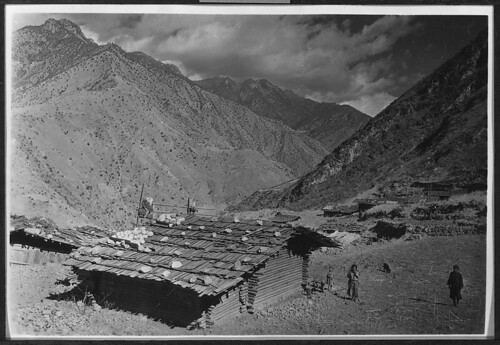
Rock's Naxi bodygaurd replied by demanding that the Tibetans should dismount and show respect to the 'big foreigner'.
"I now took part in the interchange of 'civilities'," says Rock, "... giving the lama a lecture accompanied by threatening gestures. Out comes the priests tongue in deference, which, with upward pointed thumbs, denotes the most humble mode of greeting where Tibetan customs are in vogue. We pass the cavalcade without a sign of recognition by either party."
As Rock progressed up through the virgin forest of firs he marvelled at the metre-thick tree trunks, noting that: “no woodman's axe has ever echoed here.” Sadly, the same could not be said for the pine forest I saw in 1994. It had been logged haphazardly, with whole swathes taken out of some hillsides. It looked like the handiwork of amateurs, as smaller trees had been hacked down and left to rot where they fell.
The forest was dotted with such clearings, and the few patches of grass I came across were usually scarred with the remains of campfires, and rutted with well-worn tracks. On either side, landslides had swept down the eroded hillsides, churning up trees and earth into ugly, twisted heaps. And yet there was still some areas of unspoiled nature and beauty left. When I crested a shallow ridge, the grey rocky mountain ridges of Muli came into view. They appeared larger and closer now, and were an impressive sight against the clear blue skies. Forested hills extended as far as the eye could see. Below me, in the valley, were the log cabins of Lijiasuin, the first village in Muli territory. It looked like it hadn't changed much in the last 60 years: in fact, the village was positively medieval, with no electricity, roads or machinery of any kind.
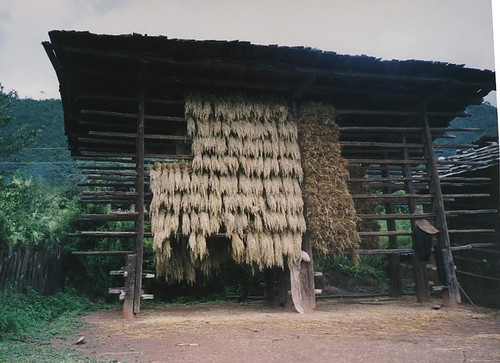
As I sauntered through the settlement it appeared to be deserted, except for a few chicken and piglets. Everyone must have been working in the fields. I asked directions from an old Yi woman I found tending goats, but she just splashed her feet in a stream and giggled in a strange high-pitched voice. I got the same non-response higher up in the forest, when I asked two young goatherds the way to Wujiao. They could not or would not speak Chinese, and just gestured mutely towards the top of the hill. Not surprisingly, I was soon lost on a myriad of trails running through the patchy forest, until I eventually fought my way up along goat tracks onto the next ridge, where I gained an even more impressive view of the Muli mountains.
Going down the other side, I thought I could hear voices, and then came upon a group of wretched Tibetan nomads, sitting around some smouldering logs. They wore what looked like animal hides, had blackened faces and were eating meat off some bones they held over the fire. They eyed me suspiciously when I asked them the way to Wujiao, and I left without a reply, their dog snapping at my heels, as I headed further down into this creepy valley.
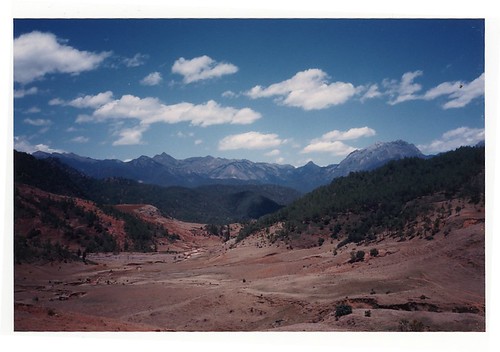
By late afternoon my mouth was parched. Tramping down through the pines and blooming violet rhododendrons, I craved water and was wondering how much further it could be to Wujiao. I was expecting a place a bit like Yongning, with a few stores, a noodle shop and a guesthouse. My heart sank when I turned a corner and saw the collection of dirty, fly-blown log cabins. No sign of a guesthouse or shop. This was Wujiao? When I reached the first house I was so thirsty that I begged a drink of water from a Yi woman who emerged from one of the kennel-like interior, and drank it straight down regardless of the grease-smeared bowl it came in and the bits of soot and leaves in the water. In her dirty black Darth-Vader-like robes, she stared at me and pointed further down the hill. “Wujiao...” she croaked. Thank God, this dump wasn't it.
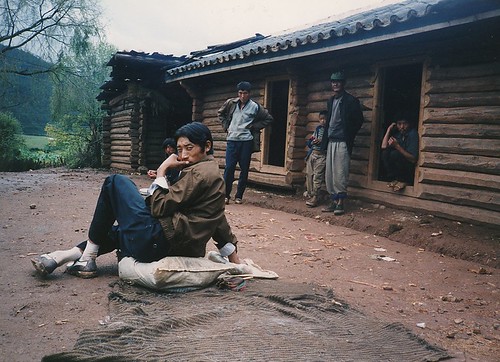
The real Wujiao was a group of barrack-like buildings, with a single shop in a courtyard. Two Tibetan girls sat by the roadside drinking baijiu, and they invited me over to sit down and share their firewater. However, I wanted water desperately. I stumbled onto the wider dirt track that was the main street of Wujiao, and in front of a kiosk met a small Tibetan man in blue Chinese working clothes. There was no running water here, he said, but he invited me into his shed and built a fire to boil me some hot water. I sat, exhausted, but glad to have finally found someone who could speak Chinese.
No sooner had I sipped my first bowl of sooty-flavoured water than I heard the sound of a car engine. That's strange, I thought, as I wasn't aware of any roads around here. I rushed out of the door just in time to see a Jeep screech to a halt in front of the kiosk. From it emerged three men dressed in a mix of army and civilian clothes, and they were holding AK-47 style machine guns. I froze with fear at the sight of the weapons, and prepared myself to be frog-marched off for interrogation about what I was doing in a forbidden area. A suavely-dressed Chinese man appeared to be the leader of the group, and he had a brook-no-argument cockiness about him that reminded me of some Chinese plain-clothes cops who'd done a stop-and-search raid on my bus to Guilin.
When he saw me, the Chinese man walked over and to my surprise held out his hand to give me a firm handshake, accompanied by a friendly “Ni hao! Ni hao!”
Where had I come from? He wanted to know. I told him about my walk over from Yongning and - thinking honesty the best policy - about my aim of getting to Muli. “Wow! That's tough! I really admire your spirit,” said the man, and explained that he and his group were Party officials on an 'inspection tour'. They'd been driving all day over some rough mountain trails to see some remote villages and were now on the way back to Muli county. It would take four hours by car, twelve hours on foot to get to Muli, he told me. As we were speaking, the Tibetan shopkeeper came running out with a live chicken, which he pressed on the Party official. The leader made a show of trying to refuse, but the shopkeeper insisted: “It's really nothing, please take it …” he grovelled.

I still felt nervous with the guns being toted around, especially as the two other goons were eyeing me very coldly. The young Party man in his leather bomber jacket and neat slacks, exuded a mixture of menace and uncontested power. He simply patted me on the back and wished me good luck for my trip to Muli. “Sorry we can't give you a lift. Full up!” he guffawed.
And with that, they got back in the Jeep and took off again, leaving me and the shopkeeper in a cloud of dust, but both of us looking relieved. I went back the shack inside to finish my water, and asked about the old lamasery of Rendjom Gompa mentioned by Rock, which the shopkeeper told me was only a half-hour walk away.
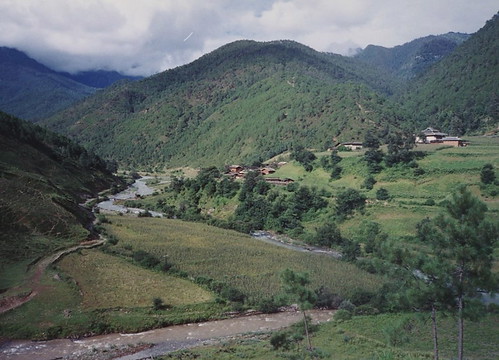
The track down to the monastery followed a river through a dramatically narrow defile with dangerous-looking overhanging cliffs. Out the other side, perched on top of a grassy hill was a small white building with a backdrop of mountains and pine forests. This was the one-man lamasery of Rendjom Gompa.
I managed to crawl up the grassy hill to the monastery, dodging an aggressive dog on the way, until I found a doorway through a whitewashed wall that surrounded the monastery. The lama, Aja Dapa, beckoned me into his dim scullery, where a young boy helper prepared butter tea around the fire. Neither spoke much Chinese, but they treated me with simple, unforced hospitality. The lama was a burly Tibetan in a maroon robe, who laughed heartily when I passed on the message from the Yongning policeman.
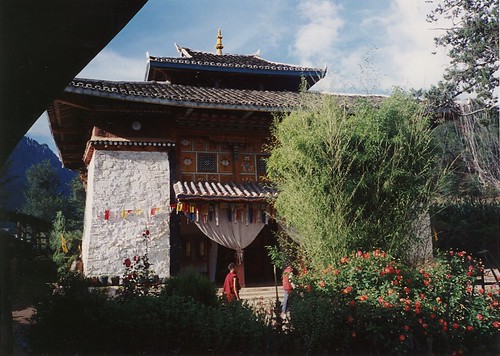
I drank my muddy butter tea and tried to comprehend the lama's slurred Chinese. He said his lamasery was not worth seeing: the place was falling down, the roof leaked and there wasn't anything of cultural value to display. The lama told me he had been in residence there for four years by himself, sent from the main monastery at Muli, now known by the Chinese name of Muli Da Si (Big Monastery') at a a place caled Wachang. After unlocking the heavy wooden door of his prayer hall with a massive bunch of keys, he showed me some faded, soot-blackened murals on the bumpy walls. In the dim light it was just possible to make out the reds and yellows of horses and gods against a black background. There were also pitted grey scars where the faces of deities had been chiselled and gouged off during the anti-religious fury of the Cultural Revolution.
“You'd be better off going to the Muli Big Monastery, much more beautiful than here,” said Aja Dapa wistfully.
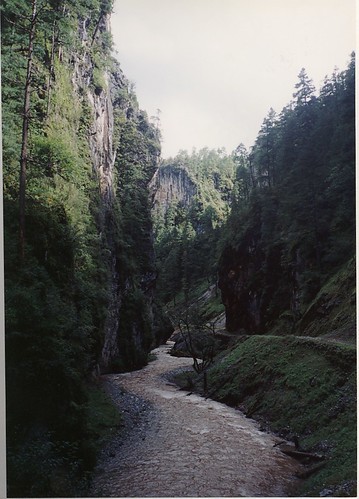
I thanked him and trudged back up through the gorge to Wujiao. It was a rough old place. Young Tibetan guys wearing brown off-the-shoulder capes, stetsons and with the brass scabbards of long knives dangling from their belts, loafed around a couple of pool tables, playing clumsy pot-shots that sent balls flying off the table. They stared at me with a wild intensity when I walked among them and there was a dangerous air of boredom, territoriality and brooding macho restiveness. It didn't feel safe.
There was no guesthouse or anywhere else to stay in Wujiao, but my new shopkeeper friend took pity on me. He laid a few bits of sacking on the floor of his cabin for a bed, and prepared me a disgusting evening meal of noodles in a grey soup, in which floated chunks of bone and fat. Two tall Tibetan girls in western-style trousers and jackets came and stood in the doorway to stare at me as I choked the food down. They shouted questions at me in yelping voices, and couldn't take their eyes off me. “You look handsome,” said one of them. “But you've got a big nose!” sniggered the other. "Are you alone? Aren't you afraid? Where do you come from?"
I gave the stock replies in Chinese.
“You're an interesting person ...” said the first girl. As with the woman in Yongning, I wondered where the conversation was leading, but the two Tibetan girls, curiosity satisfied, then abruptly disappeared. I saw them again later that evening, when I went for a wander to explore the village. They were in Wujiao's only room with electricity; the TV viewing hall. The whole village, some seventy people, turned out to watch some Hong Kong videos that had been dubbed into Mandarin. I wondered what these country folk made of the Kowloon high-rise estates and the British-style Give Way road signs they saw on the screen. When I returned to the shopkeeper's cabin, he brought some of his mates round to look at me. They sat on the floor, swigging baijiu from a bottle, and pinching the hair on my arms. “You must have a lot of hair on your chest, and down there too, eh?” one said, gesturing at my groin.
"What do you think of Tibetan girls? More pretty than English girls?" they asked.
I turned over on my bedding, pulled a spare chuba around me and tried to give the hint that I wanted to steep. Eventually they got bored of talking about my strange big boots, my ugly body hair and my funny eyes, and they left. I tried to ignore the moonlight and cold wind seeping in through the gaps in the logs.
Tomorrow would be a long day, and it was time to hit the sack, literally.
Walking over the pass to Muli
On the third day of walking, my destination was the town I had been told was called Wachang. I did not know what I would find there, but according to my old map it was the site of the Muli monastery.
In his account, Rock described a trip over a mountain pass infested with brigands, and his map showed two peaks: Mt Gibboh and Mt Ladze. These were presumably the two greyish rocky peaks that I had seen from my walk in from Yongning, and they still looked quite a long way off. Since everyone said it would take 12 hours to reach Wachang, I set off bright and early after a revolting breakfast of boiled rice and stale eggs. I bought a couple of bottles of 'Pilu', a sticky sweet barley sugar drink, and paid the shopkeeper a whopping 20 RMB for my board and lodging. I was too tired and impatient too argue with him. He assured me there was a primitive road all the way to Wachang, and sure enough, the switchback road headed up into the pine forest and around the sides of a steep valley.
I soon left the log cabins behind me, and was alone in the hushed forest, tramping along to the sounds of rushing water, cuckoos, and the wind rustling the trees. With such a long walk ahead of me, I adopted the route march tactics my dad had told me about from his army days in Italy during World War II: a five minute break every hour for a smoke or a drink. Later in the day, after relentless tramping, I would look forward to these five minutes and relish every second before I had to hit the road again.
As I climbed higher into the forest I began to feel nervous and lonely. My imagination went into overdrive. Why were there no local people walking this track? Why were those men in the jeep carrying guns? Were the local Tibetans not friendly? What if there were bears or wolves about? I picked up my walking pace and made sure the Tibetan knife was handy in my pocket. The only signs of human life were the remains of campfires in the middle of the road, and the many trees felled and left to rot.
Around mid-morning I was passed by the jeep I had seen yesterday in Wujiao, taking the county officials on their way back to Muli: it laboured past in a cloud of dust, the driver yelling “Couldn't fit you in!” and the rest of them laughing at me. This transformed my nervousness into determination: I would show them that I could do it. A couple of hours later I reached a minor pass, denuded of trees, which led through into a second, immense forested valley. This canyon was blocked at the other end by the grey-blue crags of what I assumed to be Mt Gibboh. I could see the road trailing away, skirting the high sides of the valley, following every loop and spur for mile after mile. In the distance, a tiny horizontal line ran just underneath the top of the mountain ridhe: was that the road, or a geological fault? It looked so far away and unattainable. For the next few hours I was stuck on that track through the valley and it seemed like I was making pitifully slow headway: trudging round one blind corner only to see yet another corner a mile ahead.
At one point I was forced to follow a large loop up into a side valley: I could see the track emerge again ahead of me just a few hundred yards away, directly across the chasm, and yet I had to follow the long side detour for an hour; the sides of the valley were far too steep and densely forested to think about cutting across. I passed frozen streams and abandoned log cabins, and had established a good walking rhythm by the time I stopped for lunch beneath the crags of Mt Gibboh. As I ate the last of my supplies (a pineapple, some peanuts and a fig cake), I gazed up at the road that disappeared through a cleft in the mountain: that was my next goal.
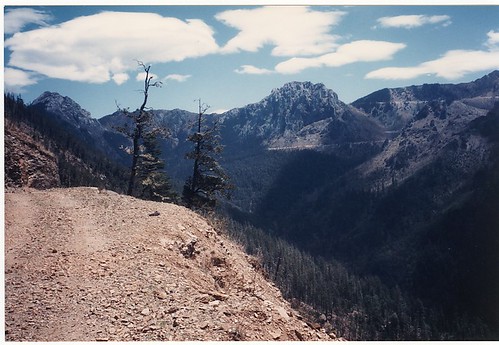
When Rock made the same trip in February 1924 his party spent the night camped near this place, sheltering from a blizzard under the crags as "snarling leopards" prowled around outside his tent. Were there still bears and leopards around, I wondered? When Rock crossed the 15,000 foot pass the next day he was on the lookout for brigands who were said to lurk behind the crags. But in 1994 I saw not a single soul in this lonely valley.
By mid afternoon I was running out of steam. Resuming my walk after lunch I had to go through the 'pain barrier' because my feet had become so swollen and aching from the incessant walking, and my shoulders were painfully sore from the straps of the cheap knapsack digging into them. Eventually, I found myself almost level with a snow-capped ridge to the right, and I gulped in cold air and shivered in the increasing wind.
Just before I reached the pass, a wild-looking Tibetan woman emerged without warning from the pine forest. Wrapped in an animal skin cloak, she hurled abuse at me in Tibetan and pointed back in the direction I had come from. Then, just as quickly as she had appeared, she turned and walked back into the apparently empty forest, leaving me with an uneasy feeling about what lay ahead. By the time I did reach the pass. I was so worried about the time that I forgot to emulate the example of Rock's Tibetan guides, who had leapt into the air and shouted “La Rgellah!” (The Gods are victorious!').
The pass was a turn in the road, which seemed to be on almost on top of the mountain. It had a few prayer flags flapping from a couple of cairns, and previous travellers had left items of clothing such as trousers flapping from some bare, windswept trees. On the other side of the pass, I was presented with the view that had captivated Rock sixty years ago: “...a sea of mountains, range upon range, like the furrows in a field, with a deep ravine from north to south, down which runs the Litang River...”
There was, however, no sign of Muli. I could see nothing that looked like a monastery or a village. Just a lot of forest and scrub, and the many bends of the switchback dirt track going down into the depths of the valley.
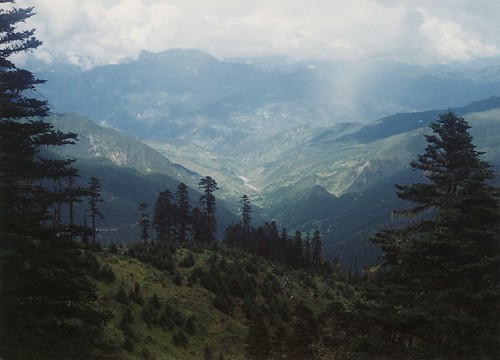
More immediately, I was faced with a steep descent through a forest: way below I could see a few cultivated terraces, which would surely take an eternity to reach if I stayed on the endlessly spiralling switchback loops of road. It was getting late in the after noon, and in my urgency, I opted to take a more direct route and struck out off the road, stumbling through banks of thorns, over fallen logs, and slipping in the soft soil. My progress was slow and painful, but I began to notice changes as I quickly lost altitude: the air became warmer and there were smells of grass and trees instead of the ice cold wind and nervous sweat of above. And the forest was different: deciduous beeches instead of the spruce and pine of the previous valley.
Rock wrote of this place: "We descended through a steep forest of spruce and fir, with rhododendron trees as underbrush; lichens and mosses covered trunks and boulders. All was hushed."
Down, down, I went, for an hour and another hour, until eventually I came across the first signs of human life: a forestry station, deserted except for a sprinkler system in its nursery. I walked on, and further along I met my first humans: a road gang, fixing a washed-out bridge. They stared at me and told me in reply to my questions that Wachang was three hour's walk away. Three more hours! I was exhausted and had no drink left, so I drank some water from the stream and hoped it wouldn't be contaminated by giardia or other bugs. It was still a long plod through the valley, my mouth still dry, my lips cracked and sore. The backs of my hands were burned red by the wind and sun, and my feet were painfully tender. But there were encouraging signs: I came across a few Tibetan houses like chalets, with verandas painted in cheerful blues, reds and yellows, and I was now following a clear stream running alongside the road.
I daydreamed about what Wachang might be like: a real town, perhaps, with roads and restaurants and guesthouses with soft beds. I envisioned being sat in a cosy room with a plate of stir-fried pork and tomatoes with rice, and a bottle of beer... Just around the next corner, perhaps. Meanwhile, I had become sick of the sweet Pilu juice, and sucked on some dried plums to keep my raging thirst at bay.I saw a few more Muli Tibetans walking on the road. They wores simple farming clothes, and seemed indifferent to my presence. Somewhere in this vicinity. Rock had halted his caravan to despatch a messenger ahead with his card to the King of Muli.
“It would not do to arrive in Muli unheralded,” he wrote. "Some of my Nashi men who had been to Muli several times were anxious that I give proper presents to the king, lest we be uncivilly received.'
Rock noted that the Muli women wore "grey woollen skirts with fringes, and leather jackets. Their wealth of hair, much of it false, was decorated with garlands of gilded Sichuan rupees."
In the 1990s, however, the Muli Tibetans had adopted contemporary Chinese attire. There was a shop in one of the Tibetan chalets along the roadside. The owner was sat inside sipping tea with his friends, all clad in Mao Zedong jackets and proletarian caps. He didn't seem too surprised to see a foreigner walk down out of the mountains, and was more interested in my walking stick than me. There still seemed to be long way to go down the valley, but he directed me onto a path over a nearby spur, saying that Wachang was only 20 minutes away.
My heart sank as I clambered up the hill, as it seemed highly improbable that there could be a real town on the sides of this valley. I pressed on, utterly worn out, yet having to muster energy to lob stones at some aggressive dogs that ran out barking at me from the nearby houses. Then, around the next corner, I got my first view of Muli. About a mile away, high upon the side of the valley, below a crenellated mountain ridge that I recognised as Mt Mitzuga, I could just make out some roofs and some white buildings of what looked like a walled village. Muli monastery, surely?
I was excited because this was Muli, my goal, but disappointed because I knew this tiny settlement would he none of the soft beds or fried pork that I had set my heart on. Ah, well - it was evening and there was nowhere else to go. I would force my presence on the monks and hope their hospitality was as good as that of Renjom Gompa.
As it turned out, I needn't have worried: the buildings on the hill were not those of Muli monastery, but of its neighbouring village of Wachang. After struggling up a garbage-strewn hillside. I entered the complex literally through the back door - a doorway set in the whitewashed mud wall. This led into what seemed to be a school playground, and I worked my way between some concrete walls to suddenly emerge into the centre of a village complete with main street, stores, pool tables, a market area and, inevitably, a Communist Party headquarters. It wasn't Muli monastery! Nevertheless, this was my big moment. I recognised that mountain ridge as the Mt Mitzuga from Rock's pictures. Therefore, I knew I had arrived at what had once been old Muli.
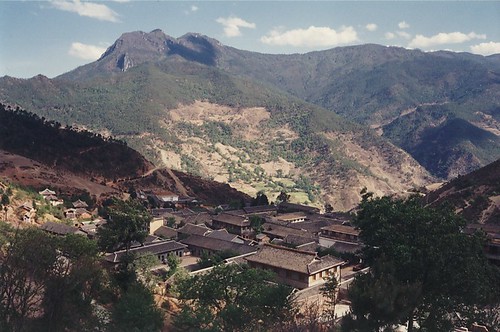
What I had not realised in my confusion on arrival at Wachang was that the Muli monastery and was a separate settlement, located on the other side of a ridge about an hour's walk away. But that did not matter right then, I was just happy to be back in 'civilisation'.
Within an hour of my arrival in Wachang, I was the talk of the town. I was sat in a wooden shed that contained the village's only restaurant, with my feet in a bowl of hot water. I was devouring the feast of dishes set before me by its beaming Chinese owner: fried pork, rice, egg and tomato soup, cold sliced ham, plus tea and beer. At the same time, I chatted to both the village's doctor and the local English teacher from the Middle school. They confirmed that I had arrived in Wachang, and that this had once been known as 'Muli'. There was now a 'new' Muli, shown 100km away further south on my modern map, but this was actually a town everyone knew as Bowa. It had become the administrative capital of Muli county in the 1950s, and had inherited the county name.
The English teacher, a bright young Han Chinese man, promised to take me to see the monastery the next day. He had never seen a foreigner before, and wanted me to visit his school to give a talk to one of his English classes. I explained about how my journey was in the footsteps of Joseph Rock, but they had never heard of him.
When I mentioned that I would like to visit the other two major monasteries in the area, they shook their heads and grimaced. “All gone,” said the restaurant owner, Mr Zhang. “There's not much left at Kulu now. It was all destroyed in 1958. There used to be 500 monks there, now there's nothing really to see. Up the road at Waerdje there used to be 300 monks, now there's just a small prayer hall. And the big monastery here isn't what it used to be.”
The people who gathered around me in the small shack had never seen a foreigner before and couldn't believe that I had walked all the way over from Wujiao alone. “Aren't you lonely by yourself?” they asked. 'Weren't you scared?' 'Did you meet any bad people?' I didn't care, I was in heaven. Food, drink, sitting down. I retreated to the luxury of a real bed, albeit a filthy one with unwashed sheets, in the 'Post Office Guesthouse', where I could hear the people in the next room talking excitedly about 'the foreigner'.
I soon started itching when I lay on the bed, but even the bedbugs couldn't stop me from falling straight to sleep.
A visit to Muli monastery
I didn't know quite what to expect when I visited the Muli monastery the next morning. Certainly I knew it would not be the centre of the old 'lama kingdom' any more. The Tibetan monasteries hereabouts had been destroyed by the Chinese in the late 1950s, well before the Cultural Revolution, because they had been the centres of political as well as religious power.
Even Rock had the foresight to realise that the days of independence would soon be over.
"These chiefs are now an anomaly in China, and before long they must become a thing of the past," he wrote of local tribal leaders such as the 'king' at Muli. If Rock's description is anything to go by, life for Tibetan villagers under the Muli potentate could be harsh, and often lived up to the Chinese propaganda claims of a wretched serf society. While Muli town itself was essentially a monastic community, Rock noted that the local villagers walked around with bowed heads because they were forbidden to so much as look a monk in the eye. The king, although described by Rock as amiable, ruled despotically, served by a court of Yellow-hat Buddhist monks. He kept the mummified remains of his uncle in a gilded shrine in the dining room, and had his own turds moulded into pills which were given to the peasants as a cure for their diseases.
The Muli kingdom had been poor, its 22,000 inhabitants depending for food on a few terraces of wheat on the hillsides. Some peasants survived by cutting grass, which they sold to passing caravans for horse feed. There was some panning for gold in the Litang River, the proceeds of which went to the monastery. The land was often not enough to feed the local people, who as a result became enslaved to the local monastery if they could not pay for their food.
A local folk song went:
“Eight or nine years work earns only 13 bags of rice,
Sell all your property hut still not enough to buy food.
Give your wife and daughter away,
And be whipped and thrown into, jail.”
In this respect at least, Muli had improved somewhat.
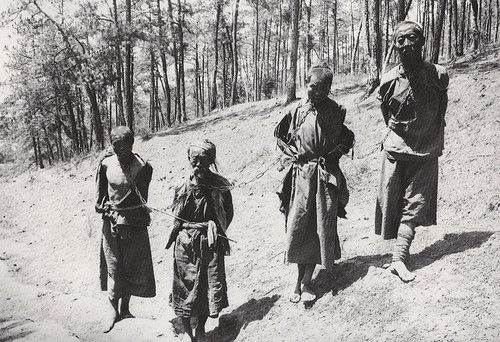
I had steamed bread and cabbage for breakfast the next morning, and met the local English teacher who said he would take me for a visit to the monastery. We climbed a path that rose above the town, to a burnt-out barracks and the remains of some trenches that had been used by the PLA to defend Wachang from marauding bandits in 1958. Even several years after the so-called peaceful liberation, the Muli region continued to be plagued by bands of Tibetan robbers, who emerged from their mountain hideouts to raid places as far afield as far as Lijiang.
“What happened to them when the PLA came?” I asked. “Defeated, of course!” said the teacher, grinning.
Once we got over the top of the ridge and through an archway, we gained glorious views in both directions. To the west was the valley I had come down the previous day, with the neat rectangular walled village of Wachang sitting just below us. In the opposite direction, to the east, green terraces descending into an even deeper and wider Litang River valley. Up here. the soil was brown and barren. Beyond, the mountains rose up, black, their details cast into shadow. And overlooking everything else were the mighty blue-grey towers of Mt Mitzuga, standing out against a deep blue sky. We walked around the hillside and I asked questions about the monastery.
It was at this spot of which Rock wrote:
"One of my soldiers took me to an open spur and pointed north, where upon a sloping hillside lay Muli, bathed in the sunlight. I also looked upon a sea of mountains, range after range, like furrows in a field, with a deep ravine from north to south down which runs the Litang river."
Before entering Muli, Rock pitched camp here and sent a soldier in to the walled city to deliver his visiting card to the lama king. He wanted to make a grand entrance. While waiting, he met the first Muli people - some Pumi women who came to sell barley as feed for his horses.
The teacher told me there were now 50 young lamas in residence at the Muli monastery, young apprentices recruited from among the local Tibetan population. Most of them could not speak Chinese, but he would translate for me, he said. For the time being, he was more interested in finding out which countries I had visited, and how much I earned.
The first building we came upon was a white hut straddling a stream. Within was a large yellow prayer wheel, turned by water power, sending its blessings spiralling into the blue sky. Twenty minutes later up the dusty track, we rounded the corner to Muli monastery.
When Rock visited Muli in 1924, it was a 400-year-old lamasery complex containing about 300 houses and temples, and surrounded by a large circular white wall. Muli was one of three large monasteries, which along with Waerje and Kulu monasteries served as alternating homes for the Muli king. Rock entered Muli with his retinue of Siamese, Tibetan and Nakhi servants, bearing the gift of a rifle for the king. He was greeted by the 'prime minister' and other king's servants, clad in red robes, who escorted him to the palace square to the sound of 'trumpets, conch shells, drums and gongs, besides weird bass grumblings of officiating monks.'
My own arrival was a little more low key: I was greeted at the gateway by the head lama and a group of teenage monks, who were clad in maroon togas and wearing green army plimsolls. The grey-haired lama also wore a natty glittery-pink waistcoat under his gown. Looking around, it looked like few if any of the original buildings remained from the once-great monastery. A few tooth-like protrusions of earth and brick were all that remained of the larger halls and palace. It looked like the whole complex had been completely razed to the ground.
The one major building that had been rebuilt was a large white Tibetan-style temple with an orange tiled roof. It had a square enclosed courtyard, around which were the living quarters for the young monks.
Up the hill, beyond a sad scattering of ruins, it looked like a second smaller temple was being rebuilt on the site of the most sacred of the former buildings.
Muli was a beautiful place despite the fallen glory. Bathed in the spring sunshine, the white buildings had an unearthly air as they dominated the valley and mountains beyond. Full of anticipation, I was led through to the courtyard, where young monks squatted over easels, bowing their heads and reciting from scrolls of sacred scriptures. Their chanting suddenly died down as they realised a foreigner was present. This was the culmination of my trip, and I felt slightly in awe of the place.
On his arrival at Muli, Rock had been greeted by a Tibetan lama in a crimson robe who bowed deeply, presented the king of Muli's card and made a formal speech of welcome. The visitor was invited into the king's domain. Passing pyramids of Mani stones along the trail, Joseph Rock made the grand entrance to Muli that he desired:
"A row of courtly priests stood in waiting and bowed at my approach. I was conducted along the wall to a new house with a terrace, outside of Muli proper, and when I was comfortably settled I was asked when I wished to see the king, who was anxious to see the stranger."
Rock changed from his riding clothes into something more suitable for meeting the regent or 'Gyalpo' of this tiny kingdom. He took with him his Siamese boy servant, his Tibetan cook and two Nashi servants, dressed in their finest, and carrying his gift to the Muli king: a gun with 250 rounds of ammunition.
In the palace square he heard the weird sounds of trumpets, drums, gongs and conch shells emanating from within the main temple. He entered via an imposing gateway flanked by two large bundles of whips and was led inside, up a dark staircase and into an anteroom guarded by a greasy curtain "black from the marks of buttered fingers".
From here he was taken into the brightly-lit reception room to meet the king himself. Rock's description of his first meeting sounds like the scene in Apocalypse Now where Captain Willard finally meets Colonel Kurtz:
"On my approach he rose, bowed and beckoned me to a chair next to a small table loaded with Muli delicacies. He occupied a chair, facing me. I had great difficulty in distinguishing my host's features as he sat with his back to the light coming from an open bay window, while he watched every muscle of my face."
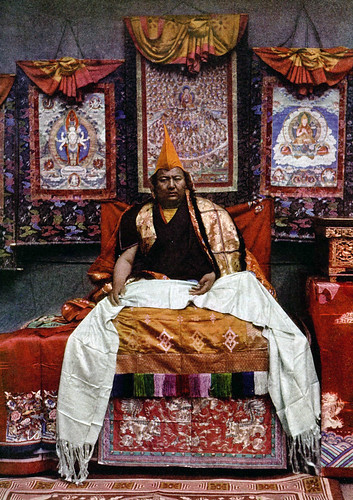
The 36-year old king was known as Chote Chaba, - or ‘Hsiang tzu Cheng Cha Pa’ in Chinese. He was a heavy, rotund man with weak muscles - "as he neither exercises nor works". And yet his manner was "dignified and kind, his laugh gentle and his gestures graceful." The Muli king wore the traditional Tibetan lama's red toga-like garment, which left the left arm bare. Beneath his tunic he wore a gold and silver brocaded vest, and had a rosary beads clenched in his left hand.
The king was accompanied by his two brothers: the younger one also a lama, the elder a "coarse individual who looks more like a coolie than a prince". There were also several lesser lama servants in the room, cringeing with bowed heads and clasped hands, waiting deferentially for the next royal command. When dismissed, they left the room walking backwards so as not to turn their backs on the king.
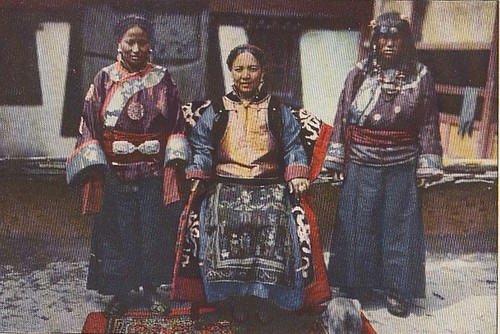
When Rock got into conversation with the king, he quickly discovered how ignorant this all-powerful ruler was of the world outside the boundaries of his realm. The king did not know who ruled China, and when Rock said he was from America, the king asked how long it would take to ride there on a horse. Chote Chaba admired Rock's binoculars, thinking they could see through mountains, and he also believed that thunder was made by dragons within the clouds.
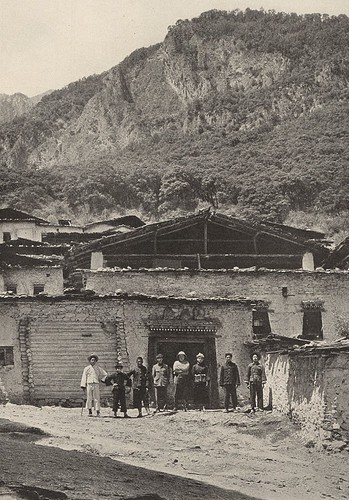
And yet despite the isolation of Muli, there were a few odd western touches to the King of Muli's living quarters. A row of kerosene lamps had been hung up for decoration, even though there was no kerosene for hundreds of miles ("no matches or candles could be had here, and the black greasy necks of the lamas - including the king and Living Buddha - showed that soap was not in demand" wrote Rock]. Rock also spied some coat hooks on the pillars - "like you would expect to see in a cheap German beer garden". And the king had his servants to bring out a collection of old photographs that depicted scenes from around the world: the White House, Windsor Castle and Norwegian fiords, for each of which Rock was asked to provide an explanation.
Later on, Rock was to come across a room in the monastery that was full of photographic equipment, all completely unused because the Muli lamas had no idea how to operate it. The gear had been a gift from a wealthy Chinese trader. Rock suggested to the king that he would be better of using the glass photographic plates to glaze his windows. Another room was fond to be full of clocks, all ticking away, even though none of the lamas was able to tell the time.
On my arrival at Muli in 1994, the head lama invited me to look around and to take pictures, waving his hand in the direction of the small rebuilt prayer hall and then leaving me to my own devices, to wander about. Entering the main prayer hall I saw there was a 10-foot high gilded Buddha.

This was only a shadow of the 50-foot high golden Buddha statue that had
been taken pride of place in the main temple when Rock had visited the
place. I wondered what had happened to the original big gold Buddha -
presumably shipped off and melted down in the name of the people.
Along the back wall of the prayer hall was a row of warlike gods, representing the spirits of Mt Mitzuga: they rode ferocious green and white lions and were armed with bows and arrows, or swords. Some of the gods had several pairs of arms and legs, others had crowns of skulls. All of the statues were covered in robes of the most beautiful hues of blue, orange, green and pink.
Rock wrote of them:
"A long flight of rocky steps led to the inner shrine, housing many gilded gods under yellow silk umbrellas ... in the centre was one swaddled in yellow cloth, entirely hidden, too sacred to be gazed upon."
Emerging from the gloom of the temple interior back into the sunlight, I left the main temple behind and climbed up the hillside beside the monastery. I wanted to photograph the temple from the high spot where Rock had taken a panoramic picture of the entire temple complex, entitled: 'The Lama City of Muli on the slopes of Mt Mitzuga'.
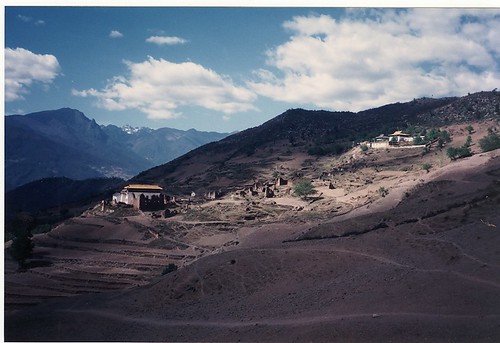

I found myself standing in about the same spot where Rock had taken his photograph, and the contrast was startling. Now the walls had gone, and the once tight cluster of white buildings was reduced to just a few brown stumps sticking up out of the arid earth. A pair of swifts rushed screeching over my head, wheeling around for insects. The atmosphere of this new Muli made me want to leave: the ghosts of the old were still around, and it felt like they were pushing me away.
I strode over the hillside to visit the only other rebuilt structure at Muli - a smaller prayer hall at what had once been the very apex of the circular white wall that enclosed the lama city. It was a beautiful, serene place, with a few apple trees growing around the entrance, where it was possible to just sit and contemplate the silence. The small building was cared for by a solitary monk who smiled and showed me the various effigies within.

When Rock visited, this place had been the king's residence, known as the 'Churah'. It was where Rock took portrait photographs of the king sat on his throne, posing in his most ceremonial robes, covered with ornate blankets and surrounded by the best furniture and carpets in the palace (and with his three King Charles spaniels shooed away at the last moment). Using his cumbersome Eastman Kodak box camera mounted on a tripod, Rock also took portraits of the king's household and deputies: his military chief, the chief magistrate, and the Living Buddha on horseback. Rock photographed the Muli king's soldier bodyguards in their ceremonial robes, and also too a portrait of the Living Buddha of Muli - a boy of 18 - in his splendid robes, mounted on a specially decorated horse. In return for taking the pictures, the king rewarded Rock with some bolts of cloth and a rosary bead bracelet that had been wrapped around the king's left wrist.
On his first visit to Muli, Joseph Rock was to spend three days being hosted and entertained by the king. They exchanged more gifts - Rock gave the king some silver coins and three cakes of scented soap (“the greasy black necks of all the lamas, including the king and Living Buddha, showed that soap was not in demand.”) This display of largesse and Rock's large entourage must have convinced the king that Rock was a man of some status. In a short time, Rock was to develop friendly ties with Chote Chaba that enabled him to return on several subsequent occasions and to use the Muli monastery as his base for exploring further afield. He was a useful friend to have, as the king's word was law in the surrounding districts. The Muli lama king had once been a living Buddha, and in 1924 he was surrounded by cringing lama courtiers. They crawled into his presence on their hands and knees and would not dare look at the king until he had touched them on the shoulder.
On his first evening in Muli, Rock was invited to dine with the king. After delivering a lecture on life in western countries, Rock was enjoined by the king to partake in some Muli delicacies. However, Rock noted drily that the quality of the banquet dishes left something to be desired, and seemed to be at odds with the expensive golden plates on which the food was served. The meal included yak cheese that was rancid and which contained bits of yak hair.
 To drink there was the usual butter tea ["like liquid salted mud"] served in exquisite porcelain cups with silver filigree. Rock was given some of the choicest items from the king's larder, which included a chunk of ham that was so worm-ridden that, according to Rock, it literally walked around by itself, propelled by "squirming maggots the size of a man's thumb". Rock had his servants throw it to some Muli peasants waiting outside his room, and observed that they fought over the rancid meat “like tigers”. The banquet also included hotpot and vegetables, with a dessert of pure cream, which the king lapped up from the bowl with his tongue.
To drink there was the usual butter tea ["like liquid salted mud"] served in exquisite porcelain cups with silver filigree. Rock was given some of the choicest items from the king's larder, which included a chunk of ham that was so worm-ridden that, according to Rock, it literally walked around by itself, propelled by "squirming maggots the size of a man's thumb". Rock had his servants throw it to some Muli peasants waiting outside his room, and observed that they fought over the rancid meat “like tigers”. The banquet also included hotpot and vegetables, with a dessert of pure cream, which the king lapped up from the bowl with his tongue.After dinner, Rock retired to his room. With the sounds of drums, gongs and the deep bass voices of some of the lamas reciting their prayers in the background, Rock took time to read the king of Muli's card. The king's full title was:
"Self existent Buddha, Min Chi Hutuktu, possessor of the first order of the striped tiger, former leader of the Buddhist church in the office of occupation commissioner, actual investigation officer in matters relating to the affairs of the barbarous tribes; honorary major general of the army and hereditary civil governor of Muli. Honorific: Opening of Mercy.”
During my stay at the Muli monastery, there was some kind of ceremony taking place. The monks were gathered in the main prayer hall and the entrance doorway was now shielded by a heavy black curtain where two young monks stood guard. From within came the sound of mass chanting by the forty or so monks. They squatted or sat in rows of low cushions arrenaged on the floor. Their chanting was accompanied by occasional outbursts of thumping on the drum and the blowing of a horn and ringing of sacred, high-pitched bells.
The incessant chanting varied in both volume and pitch and had a mesmeric quality. Sometimes it was long and drawn out, and the rise and fall of voices in unison reminded me of the football anthems sung by the crowds on the terraces at Anfield and Elland Road. One of the chants had passages that were uncannily like "You'll Never Walk Alone". The chanting would get faster and louder, rising to a crescendo that was accompanied by drums, gongs and horns. Then it would abruptly die away to a background of deep baritone murmuring, presumably done by a senior monk who must have had excellent control of his diaphragm. The repetitive chanting would then begin to build up again, this time in a different cadence and with different emphasis.

While all this was going on, young monks were running back and forth, in and out of the prayer hall, bringing in bowls of butter tea from the scullery for the chanters to drink. This was done without any regard to continuity - a monk chanting solo might stop in mid sentence to have a very loud and slow slurp of tea, and then recommence as if nothing had happened. At other times, a monk would appear in the doorway and blow a conch shell, from which a forlorn wail echoed over the courtyard and beyond, into the hills.
The chanting went on all afternoon and into the early evening. Before dinner, I took the opportunity to visit some of the young monks in their dorm rooms. Their living arrangements were just as I would have imagined boys living at a British private school. The young monks slept four to a room in bunk beds, and they had pictures of motorbikes and pop stars torn out from Chinese magazines stuck up on their walls, while one or two had radios or cassette players in their rooms. The young boys crowded round me eagerly every time I entered a room and they were very inquisitive. They would fight for the privilege of sitting next to me, and liked to finger my jacket and inspect my books and diary as if these things were of great value and importance. They giggled amongst themselves when I asked questions, but they appeared to be quite scared of the senior 'prefect' monks who enforced discipline, and who would appear from time to time to utter some sharp rebuke.
After a night spent in a mouse-infested guest room at Muli monastery I felt a twinge of regret when the time came for me to leave. I said my farewells to the few people who were hanging around the monastery 'shop' and walked back around the hillside to Wachang. On my return, the town seemed like a much jollier place after all the sombre chanting and the ghostly memories invoked by the ruins of the monastery. The Muli monastery had become a pitiful place, only a shadow of its former grandness, whereas the modern village at Wachang seemed to be a vibrant place of the here and now. At one end of the bumpy main street (there were no cars or roads to Wachang, the nearest highway was down in the valley) was a primary school, where children could be heard rehearsing Tibetan peasant songs. At the top end of the street, the Muli Middle School kids yelled out of the windows at me.
Wachang, whose name literally meant 'tile factory', had become a typical Chinese small country town, complete with a single high rise block topped with a satellite dish. It had a Post Office, a Tibetan guesthouse and a store that sold the basics of rural life: packs of dried noodles, knives, bottles of baijiu and pictures of fluffy kittens.
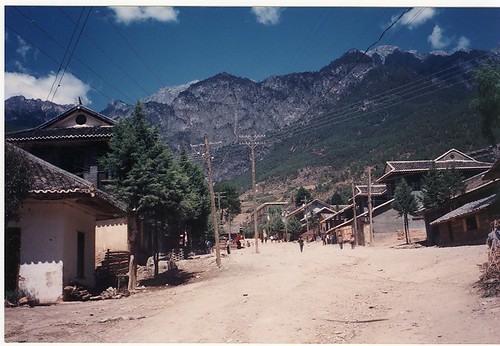
As I walked up the main street I was called over by a rough-looking man who was squatting on his haunches by a wall. By now I was getting a bit fed up with being pestered by everyone in town. However, something in the man's demeanour made me go over to him. "ID card!" he demanded, as I neared him, and he whipped out a police badge from his jacket. "Where have you come from ..?" he barked, as he flicked through my passport. When I told him I'd walked over from Yongning, he asked to see my Closed Area Permit. I acted the part of the dumb foreigner, apologised profusely and showed him the page of my passport with my Chinese visa and its many official stamps. I told the cop I would be leaving to go back the next day. The policemen made a show of studying my passport and visa, grunted, and then handed me back the passport and waved me on my way.
Before I left Wachang, I kept my promise to the English teacher and went to give a talk to the English class at Muli Middle School. I'd been expecting an informal chat with a class of around thirty kids, so it was something of a surprise when I walked into the playground to see the whole school assembled. There were about 200 pupils sitting on benches around a platform, gawping and pointing at me in excited anticipation. The teacher had rigged up his karaoke machine as a makeshift PA system and my hesitant Mandarin emerged from the speakers in muffled, triple echo.
“Teach them a few words of everyday English,” the teacher mumbled to me, so I introduced myself and told the pupils that instead of yelling "Allo!" to every foreigner, it would be much nicer for them just to say "Hi!". A few in the assembled ranks started repeating "Hi" to each other. There was an awkward pause and I then toyed with the idea of teaching them all to say “Have a nice day”, but settled instead on the more mundane “How are you?”. And that just about exhausted the snotty-nosed crowd's rote learning ability for the day.
"Tell them how important it is to learn English," said the teacher, “Many of the pupils are not enthusiastic.”
I tried to explain that English was the international language, and useful in many different fields. But to myself I thought what use would English be to a village full of Tibetan kids who would mostly end up working in the fields, and who wold probably never meet another foreigner?
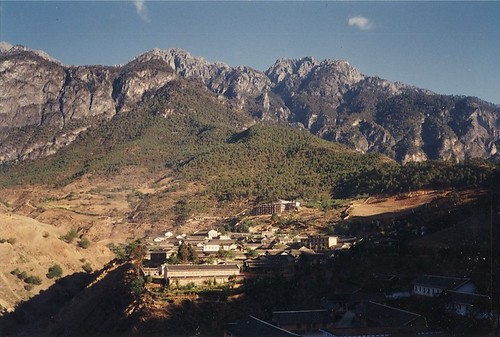
Just when I was getting into my stride, telling the kids about our strange English habits (“Never ask an English person how much they earn ...”), the teacher told me to wind up with a song. The only one he thought we all knew was Happy Birthday, which I sang to puzzled stares. The gathering broke up, and for the rest of my stay in Wachang I was plagued by shouts of “Hi! How are you?” from every kid in town.
While I was visiting the school, I went for a peep at the spartan classrooms, and gave a reading of 'The Farmer's Buried Treasure' in English to one of the classes. The school seemed to be the social centre for the kids of Wachang. They were at the windows, shouting, from first thing in the morning until I retired to my room at night. The classes finished officially at 5pm, but the pupils hung around in the classrooms all evening, doing their homework, or practising their disco dancing steps in formation, to seventies western music played on an old cassette.
I realised that the Muli kingdom I had come looking for was no longer there: Modern Muli was a world away from the kingdom of cringeing peasants of sixty years ago, when the villagers lived in fear of the monks.
It was still poor, but not wretchedly so: everyone had enough to eat. There were secret policemen, but the one who had accosted me on the street later invited me over for a game of cards. Muli was now just another small and overlooked corner of the Great Harmonious Chinese Family, with all the fruits of 'Socialism With Chinese Characteristics'. The quaint, despotic monks had been replaced by the all-pervading influence of the Party, and its pragmatic slogans of socialist construction. The fabric and culture of Tibetan Muli had been eradicated in the name of Mao, and now the old kingdom had been forgotten by the young generation, whose materialistic outlook was similar to that of millions of other Chinese.

Sat in the restaurant shack that night, I met a 'Minorities Expert' from Chengdu. I could tell he wasn't from Muli because he was wearing a tie. He told me he'd been sent from the Sichuan Minorities Institute to document the fast-disappearing traditions of the more remote mountain tribes in the province. At last, I thought, the Chinese were doing something to preserve the cultures that they had so long tried to suppress. But this man had little time for Muli and its people, whom he dismissed as just dirty Tibetans. “That's why I only eat at this restaurant, because it is run by a Han Chinese and therefore the hygiene is OK. The Tibetans don't even wash their hands,” he told me conspiratorially.
The 'minorities man' was just using Muli as a stopover on the way to visit some other matriarchal Mosuo people, further to the north. He warned me not to venture into the hills around Muli because of the danger of attacks by wild bears and Tibetan robbers. “Was that why the men I saw in the jeep were carrying guns?” I asked him. 'No, that would just be for shooting birds,' he replied. But it didn't seem likely to me. You don't use an AK47 to bag pheasants.
Saying farewell to Muli
'Destination Konkaling' had been the unofficial theme of my trip to Muli when I first set out. I'd had the ambitious plan of continuing in Rock's footsteps from Muli to 'Konkaling' - the trio of sacred mountains about 100km to the west, which had been the former lair of the bandits in Rock's day.
From Wachang I went for a recce up the ridge above the town to survey the countryside for a possible route. And I realised that walking to Konkaling from here was not on. The sheer scale of the terrain, plus my lack of supplies and equipment ruled that out. I'd been lucky to get as far as Muli carrying nothing more than a knapsack full of peanuts and biscuits. That sort of minimalist approach would not get me to Konkaling: a journey there would require camping equipment, plenty of food and a stove, and preferably a few companions for safety.
As I looked over the rise and fail of the huge hills, I realised that this was the end of my Muli trip. From here on, it would be homeward bound all the way, and I would have to leave Konkaling for another day, or for someone else to re-discover. I told myself it was probably just another Chinese outpost by now, something like Wujiao or Wachang, with concrete apartments, karaoke parlours and roads clogged with logging trucks. But it still nagged me that I would never really know until I had been there.
On his last evening in Muli, Rock was given a special dusk sending-off ceremony by the monks to ward off any bad spirits. Under the window of his room at the monastery, the lamas gathered in a circle around an oak brush bonfire. They were wearing their full ceremonial crimson robes and capes, and on their heads they wore the yellow-crested hats, like cock's combs. With a beating of drums, crashing of cymbals and the blowing of the bass notes on huge 12-foot long trumpets, the lamas, lead by a 'ghiku' dispelled the demons by throwing images of them into the flames.
Early the next morning, Rock again met with the king of Muli, to say his farewells. The king presented Rock with a tray loaded with parting gifts - among which were a golden bowl, two Buddha statues and a leopard skin. The king accompanied Rock to the gates of his palace, where his appearance in public caused the lowly folk of Muli to flee in terror. The officials, magistrates and lamas of Muli formed up in a line to the gate and bowed to Rock as he departed just before sunrise.
As Rock rode up into the hills along the track heading back towards Lugu Lake and Lijiang, he marvelled at the "vast sea of ranges, pink and yellow, with black slopes indicating fir forests ... the deep valleys lined on both sides with snow-capped crags." Muli lay on the hillside below him, "beautiful in the morning sun, an oak forest surrounding it like a sombre garland."
The visit to Muli had obviously left a deep impression on Rock:
"A peculiar loneliness stole into my heart as I rode through the firs draped with long yellowish lichens. I thought of the kindly, primitive friends who I had just left, living secluded from the world, buried among the mountains, untouched by and ignorant of Western life."

Heading back along the same route on which they'd come from Yongning via the Gibboh Pass, Rock's party ascended up to a camping ground at 12,000 feet amid a fir forest, where they rested for a night as they prepared to recross the Gibboh pass.
"There I let my dreams take me back once more to Muli, that weird fairyland of the mountains, where its gold and riches of the Middle Ages contrast with butter lamps and pine torches."
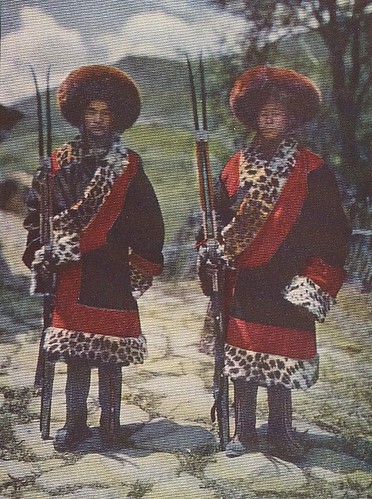
In my own way, I received a send-off from Muli similar to Joseph Rock's: he was presented with mandarins and walnuts by the king's secretary, and was escorted by some Muli soldiers. I was given a bag of oranges by the town's English teacher, and escorted to the start of the track by the restaurant owner, Mr Zhang. “I really admire you,” he said, shaking my hand as we stood on the rim of the valley. “You can really eat bitterness, and not many people can do that these days.”
I thought how ridiculous this was, describing a city softy like me as tough, when these people led such hard, unrewarding lives. I thanked Mr Zhang and left him with my walking stick, which he had much admired.
Unlike Rock, I did not go back the way I had come from Yongning, but headed south instead, down the Litang River valley intending to get to the county's administrative centre of Muli-Bowa about sixty miles away.
It was a relatively simple three hour descent down a walking track to get to the bottom of the valley, passing a few Tibetans leading their mules and their tinkling bells until I saw my first logging truck on the 'highway' that ran along the floor of the valley. The valley was a vast curving spread of wheat terraces, surrounded by the snow tipped Muli peaks.


I was able to flag down the first truck that came along, and hopped aboard next to the surprised Chinese driver. What followed for the next two hours was a white-knuckle ride as the overloaded truck wallowed in low gear up the twisting, dusty dirt road. There were often steep drops down to the river, and the driver drove precariously to within a few inches of the edge. Therefore I was quite relieved when his truck broke an axle going over a big pothole, and stopped, giving me a chance to hop off.
It didn't take me long to get another lift: logging trucks were passing at intervals of five minutes, each loaded down with five or six timbers massive of up to a metre in diameter. At this rate, Tibet would have no forest left in ten years time. This time, I got a lift on a supply truck, and sat on some boxes on the back, marvelling at the panoramic views my perch afforded of the spectacular mountain scenery of the valley. I felt a mixture of exhilaration and terror as the truck hugged the corners, and I gazed back at the receding form of Mt Mitzuga. My fellow passengers, a trio of grumpy Chinese labourers, seemed indifferent to both scenery and danger.

High up on the mountain road, the driver blared his horn at a group of brightly-dressed Tibetan lads trying to hitch a lift. Then the truck stopped and they clambered aboard. They were a boisterous, rosy-cheeked bunch, on their way to Bowa to sell some traditional Tibetan herbal medicines in the market. Most of them wore the dark red cloaks with stetsons, fur hats or trilbies. They beamed at me and one of them nipped me on the arm, asking questions in fudgy Mandarin: Had I been to Lhasa? No? What a pity. Would I like to buy some Tibetan medicine? He pointed to a gazelle horn sticking out of his bag. No,thanks.
The rest of the Tibetans gathered round, putting their arms around me and pulling at the hair on my arms:
“So ugly! Hey, we can give you some oil to get rid of it...” said one.
“Are you married? Do you think Chinese girls are good looking? Would you like to sleep with one?" I began to feel menaced by these guys: the younger ones seemed friendly but the older ones now looked nasty. And they all carried those Tibetan daggers at their waists.
They continued their barrage of questioning, wanting to look in my bag, and for me to show them my camera. I fobbed them off. and for a while they changed the subject.
“Has your wife got a nose like yours?” one of them asked. “No,” I replied.
“That's just as well, because yours is big enough for two people!” Laughs all round.
“Which is better, Britain or China?” asked another.
They've both got good points, I said. I noticed they referred to themselves as Chinese rather than Tibetan. “What do the English think about giving Hong Kong back to us Chinese? They must he really unhappy!”
"Most British people couldn't care less," I said.
Then we got back onto the subject of money. They wanted to know how much English money I had, and what an English pound note looked like. I told them I didn't have any. Then they wanted to know what was in my money belt.
"You foreigners are rich. Give us 50 yuan for food. We haven't got any money!" one of them complained.
I didn't reply.
“It's very dangerous around here, you know. Thieves, bad people. You could get stabbed or shot. Aren't you afraid?”
When I said no, another one replied: “You should be - but we can protect you, if you give us 50 yuan."
Another one of the Tibetans leaned over me: “This guy here is a kung fu expert, he could kill you with his bare hands," he said. “Have you ever been stabbed or shot? Do you know what it feels like? Someone round here could kill you very easily,” said one of the men with his arm around me.
I mumbled something about not being able to spare any money. "What about your camera? How much is that worth?' said one.
“How about you swap it for this knife?” said the Tibetan next to me. He pulled out the blade from its sheath and held it an inch away from my face. “Look, it's really sharp...” and he held the blade so it almost touched my skin. They all laughed, and one of them said: “He's scared.”
They had my undivided attention now, and I noticed the Tibetan holding the knife had a locket of the Dalai Lama around his neck. I was scared. Our fellow passengers, the Chinese labourers, were at the front of the truck and looking the other way. We were in the middle of nowhere: no villages or friendly policemen to seek help from. I sucked in my stomach muscles involuntarily, expecting a sudden thrust of a blade.
Fortunately, at that moment the truck juddered to a halt, and the truck driver climbed out to inspect a wheel. The tense atmosphere was suddenly broken, and I leapt up, pulling my bag with me, and jumped over the side of the truck. The driver was busy fiddling with the wheel nuts and I padded round the side of the truck, wondering what to do. Would these Tibetans jump off here too, if I stayed? Could I escape into the forest?
The driver was getting back in the crowded cab and starting up the engine, and he waved me back on board. When I insisted on walking, he asked me what the problem was. I murmured something about the 'bad eggs' on the back wanting to take my money. “Get in,” he said, and I squeezed in with the other two passengers in the cab. When I told him what had just happened, he laughed. “Oh, they're just a bunch of kids, nothing to be afraid of.” Nevertheless, he stopped the truck at the next corner and unceremoniouly kicked the Tibetans off his truck, and I sighed with relief.
Returning to civilisation
It took me another three days of hitching on trucks and riding overcrowded buses to get back to Lijiang. I loved riding on the trucks: stood up on the back in the open, facing ahead and looking over the driver's cabin like I was a panzer commander. I wore a scarf over my face to keep the dust out, which along with my baseball cap and sunglasses created a disguise that managed to fool a few of the staring peasants. It was tiring though, and after a couple of hours of standing up I would try sitting down on the flatbed, only to be bounced jarringly around with every pothole and end up covered in dirt.
The scenery was spectacular for the first two days going through the Litang River valley; the same epic hills as surrounded Muli, covered in pine and spruce, and barely inhabited but for a few Tibetans and Yi eking out an existence from the narrow terraces of barley. As we travelled further south the landscape became progressively deforested, until there was only a little bit of scrubby bush left on the skeletal hills.
On my first night I stopped over in Bowa-Muli, a Tibetan-Han outpost in the hills. Its only interesting feature was a department store with a Tibetan section selling prayer wheels, portable shrines, chubas and multi-coloured woven belts. It did, however, herald my return to 'Laowai!' territory, where all the sinicised Tibetans gave me gormless stares and screeched "Allooo!" at me as they went past.
I didn't care, and in fact I felt better for being back in a 'Chinese' area. I felt safer and I liked knowing what to expect - the Chinese attendants in the guesthouse had the same matter-of-fact practicality as anywhere else, which felt reassuring after the friendly but unpredictably wayward treatment I had received from the Muli Tibetans.
In Bowa-Muli I spent the night in one of the creepiest lodgings I've ever stayed at. Not wanting to miss the early morning bus, I took a room at the Muli Bus Station Guesthouse. This proved to be a bare concrete cell on the bus station courtyard, with no windows. I felt like Steve McQueen in his Great Escape cooler cell.
My second day on the road turned into a nightmare of a journey on an overloaded bus that lurched along pencil-thin mountain roads from Bowa to Yanyuan. I boarded the ancient bus at the crack of dawn, when the dogs were still howling and the cocks half-crowing. There was a rowdy scrum of would-be passengers by the door, through which I managed to squeeze onto a ledge near the driver. It was already standing-room only when I boarded, but the horde of peasants were still climbing in through the windows bringing their sacks and satchels with them. Eventually, I found myself hemmed in by a knot of unkempt Tibetan labourers with brown teeth and shaggy hair, as the bus shuddered into life and rolled out of the forecourt.

About half a mile out of town the ribbon of tarmac road ran out. The bus coasted down a dusty ledge of road that had been cut out from the face of a sheer vertical cliff, rolling and swaying towards the distant floor of the valley. It was a long drop from the edge of the road straight down the steep sides of a scrubby canyon into a void of boulders and landslides. I looked on in horror as the ledge traversed around a large outcrop of overhanging rock jutting out from the cliff, and the road surface at this point sloped away from the cliff, with only a flimsy, flattened crash barrier between us and oblivion. I whimpered and turned away, unable to watch; it would take only one misplaced rock or a skid on a patch of loose gravel to send the whole bus straight over the edge.
When I looked again, we had cleared the outcrop and I prayed that it would be the last such threat. Unfortunately, it was to be just the first of many. For the next four hours I crouched in my seat in extreme discomfort, feeling a mixture of terror, boredom and leg cramp as I was squeezed in by chain-smoking peasants. I tried not to look each time the bus veered round another blind corner, swaying between some rocky protrusion and a dizzy drop-off, but I was scared to distraction. I couldn't read a book or think of anything else while the prospect of a messy extinction was so close at hand. This was a different kind of fear from the calculated risks of walking the Tiger Leaping Gorge; at least there I had been in control of my own destiny: here I was helpless, at the mercy of an insouciant driver and his clapped-out wagon.
It didn't help that we could see ahead, across the loops in the mountain road, to sections of road where the crumbling sides had been shored up with piles of packed stones against further erosion. And when we stalled on the middle of a rickety wooden bridge some 500 feet over a chasm, or when the driver tried to overtake an overloaded logging truck whose timbers had tipped the vehicle back onto its rear wheels, I bunched my fists, closed my eyes and wished I was back at home.
The other passengers seemed curiously untroubled by these perils of the route. When we reached a mountain pass that marked the end of the Muli hill country, they disembarked for a pee-break with a nonchalance that I thought was either extreme ignorance or the ultimate in stoicism. I sipped a can of coconut juice and revelled in the simple pleasure of breathing, and of being alive.
The rest of the day's journey was a welcome anticlimax, a relatively stress-free trundle down a gravel road to a nowhere town called Yanyuan, where I cooped myself up in my hotel room to escape the stares and 'Allos!'. The evening was passed, like so many others in Chinese small towns, with a bottle of the weak local beer and a bag of peanuts, sat in front of the TV.
The TV news showed the same items every night: scenes of Chinese Party leaders in conference, sitting inert behind rows of long desks with their lidded cups of tea beside them as some Party bigwig lectured them on a point of the economy; or the rural scenes of peasants spraying their crops with weedkiller as the announcer described a new productivity scheme. The national news gave extensive coverage to visits from leaders of obscure countries: Prime Minister Li Peng meets the president of Surinam, and mouths the same platitudes about greater co-operation and stronger ties between developing countries. And as in the west the news finished off with a human interest story: a postman in Hunan who is retiring after 40 years of dedicated service. His post-round seems to involve fording flooded rivers and scaling muddy hills to get the mail through to grateful villagers. These TV items were interspersed with unannounced adverts for air conditioners and cold remedies. With the advertising industry still in its infancy, the Chinese TV commercials relied heavily on simple computer graphics and booming, God-like voice-overs to say how grand their products were.
Back in Lijiang, I felt deflated because I knew my real journey was all but over. All that remained was to retrace my steps via Kunming and Guilin, back to Hong Kong. Now that I no longer had the goal of getting to Muli, my everyday, real-world worries resurfaced: nagging thoughts of bills to pay and jobs that needed to be done back home. I had been a long in China, perhaps too long: my mind started playing tricks on me. I found that the background babble of Chinese voices began to sound like snatches of English: I would turn suddenly on the street when I thought I heard someone behind me say "... yes, sausages ... that's the one...", only to see a couple of old Chinese ladies or a pedicab driver.
My bedraggled appearance after a week on the road attracted a few odd stares from the westerners who were in Lijiang. When I went to shave off my stubble and use some much-needed shampoo in the shower, it felt like I was washing off all my experiences of Muli. I emerged squeaky clean, to enjoy a feast of steak and chips in 'Pete's Cafe'. On the cafe wall I read a traveler's notice:
‘I have a 'Great Locos of China' to swap. It's a vast volume and a really riveting read. The chapter that refers to the engines that ploughed the route from Beijing to Chiangjao in the North-East is really quite fascinating - a remarkable account. Anyway, this especial edition is ready to he swapped. If you're interested please contact Trevor (Guesthouse 3, room 402). I'm not too picky about the book I swap it for, but if anybody has a copy of the current edition of the Modern Model Railway Makers Manual or the Casey Jones 1957 Annual, I'll be jubilant.'
Underneath this notice was another hastily scribbled addition:
‘Room Mate Exchange 'We want to swap anything with two legs for Trevor, a happy little British boy. He enjoys train watching, plane watching, bird watching, wears knickers and keeps a fascinating diary. Send resumes and enquiries to D&K, room 402.'
The cafe sold ganja pancakes and little bags of hashish, which pleased Alan from Blackpool very much. He had travelled down from Beijing and had very little nice to say about China. All the Chinese he had met were cheating, unfriendly slobs. The women were hideously ugly and the men had disgusting eating habits. The food made him retch and the beer was like piss. Alan was travelling through Asia after being sacked from his job with the council for having an attitude problem.
Twenty four hours later I was sat in the pokey Vietnamese coffee shop in a side street of Kunming. This time around, their crusty bread rolls seemed delicious and the aromatic fresh Vietnamese coffee gave me a much needed hit of caffeine. I was back in a real city, where shops had nice things, where there were real restaurants and hotels and taxis, and where the girls had legs and figures that turned my head. I bought a soft-sleeper ticket to Guilin and spent the next two days on the train by myself, enjoying the relative luxury of the compartment. As we cruised at a leisurely place through the kast landscape, I tried to read the last of my paperbacks (Tai Pan - never mind the quality, feel the width), but I was already thinking ahead to the next destination of Joseph Rock that I would like to visit.
Muli Postscript
Muli is still off the beaten track. Few tourists go there because there are no great scenic or cultural attractions. It has no great mountains like Yading, no great rivers like the Nujiang. There are no well preserved 'old towns' or colourful ethnic minorities like those of Lijiang. There is just isolation, poverty and a dead end road. A few Chinese trekkers pass through the valley from time to time, on their way to Yading via the back door route of the Shuiluo river valley. The Muli monastery still stands alone on the hillside, and some more of its buildings are slowly being rebuilt. With the coming of the internet, Muli is losing some of its isolation and mystique. You can google Muli and read about forest fires in the area, or about how migrant workers from Muli are now in places as far away as Guangzhou.
The monks of Muli have a website now, in Chinese, giving some information about their Buddhist teaching. The Muli local government also has its own website, with a few photographs of Muli’s scenery and of Pumi people celebrating in their ethnic costume. However, if you want to go see the scenery of Joseph Rock’s Muli, you will have to go soon. There are plans to build hydro-electric dams in the Litang River valley, flooding much of the valley and submerging monasteries such as those one at Waerdje and Kulu. In a sense, Muli will once again be a lost world, only this time the relics will be submerged rather than obscured.



















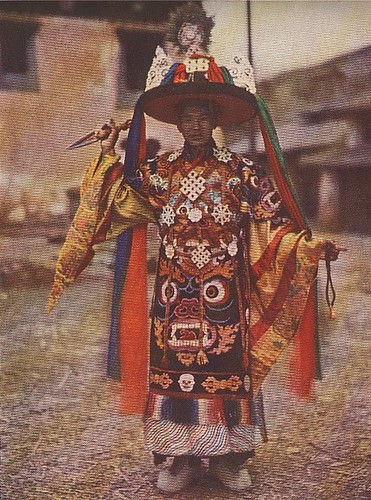
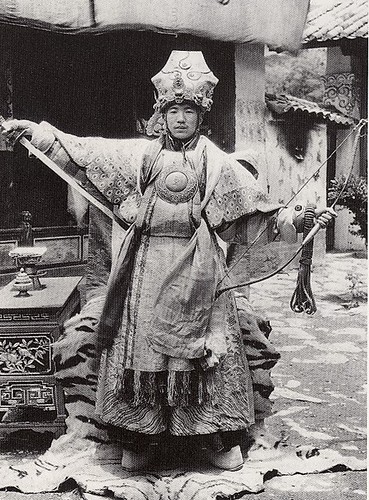
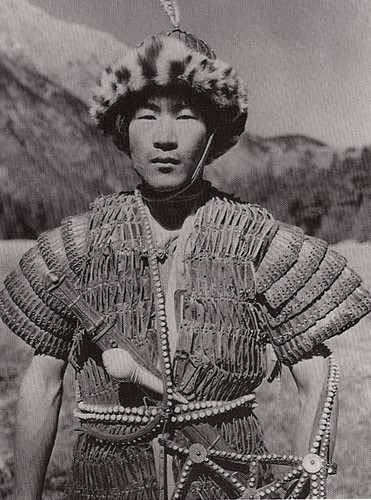




































12 comments:
thanks for the effort. You are an interesting and realistically inclined writer...and Hell...I enjoyed it.
Love your work.
Just got back to argentina after a month in Kunming, with 3 days in Lijiang.
This is an absolutely terrific account, interesting in so many ways. The ardors of the journey, the sites seen, the experiences, the insights, the contrasts with Rock -- all terrific. "English one-man band takes on US National Geo poobah and his personal traveling army" -- would be a good title. A good subtitle might be "How the world progresses." Cheers and many thanks.
Great read, appreciated the honesty.
"The greyish translucent cubes of tofu jelly" would be chickpea bean jelly (Ji dou liang fen),it's a very traditional and popular snack in Lijiang. The taste is spicy and sour, and the it was called "black tofu" in the book "Lijiang Fu Zhi Lue (Lijiang Prefecture Gazettee)" in Qianlong period (1736-1796). You can find it in Baisha Ancient Town Now.
Wonderful travelstory, love to reed it
Really enjoying your writing! I spent a month in traveling Yunnan in 1991, and another month in 1993; I wish this was available to me back then! So many of your stories bring back familiar memories. One surprise though -- I hiked Tiger Leaping Gorge both times, but have no recollection of the trail being that scary. Selective memory, perhaps?
Wow! Just wanted to say thanks for the read. I’d been romanticizing my own travels around Yunnan about a dozen years ago, but your writing brought back other memories, reminding me it was a mixed bag. Like Mr. Zhang, I admire you going places so remote, especially back then. I can’t imagine what it must’ve been in the 90s (let alone in the days of Joseph Rock)! It stayed the same for so many centuries then changed so fast.
Great read thankyoou
Thaank you for being you
really enjoyed this, thank you. considering doing something similar, tramping from yaocheng to muli to lugu.
Hey @kiwi it's a great trek between Daocheng and Lugu Lake but most people do if from the lake. There's now a ban on 'wild trekking' into Yading from this route but not really enforceable unless you run into park rangers in those remote areas.
Post a Comment